Melville, Herman 1819– 91, American

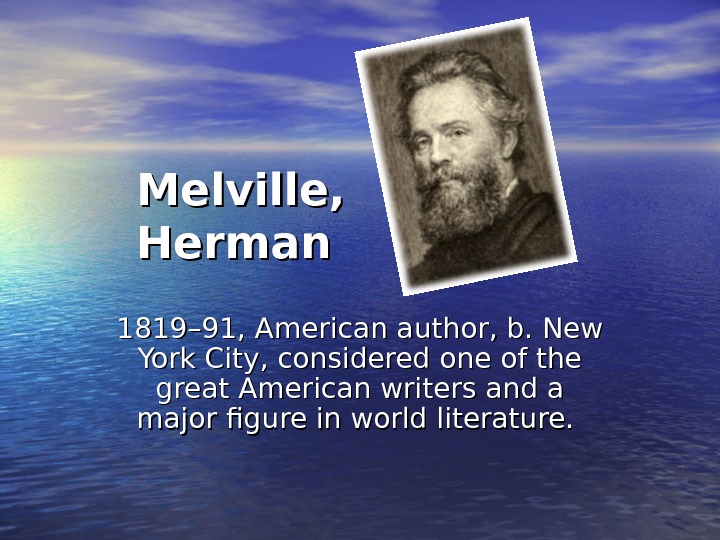
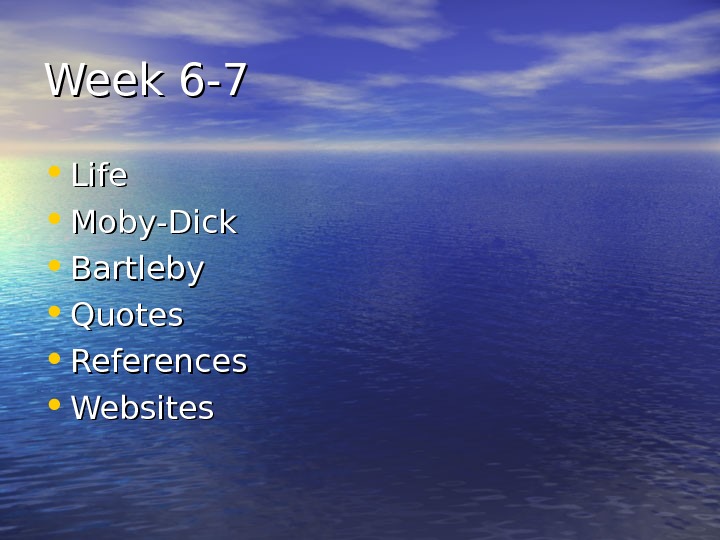
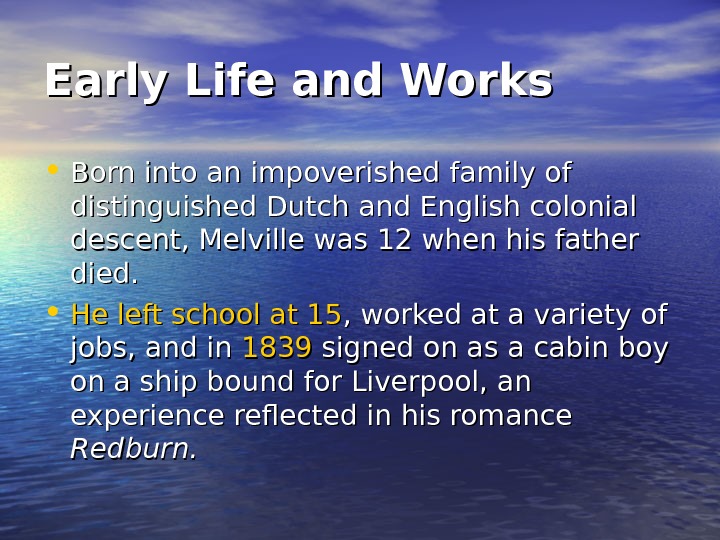
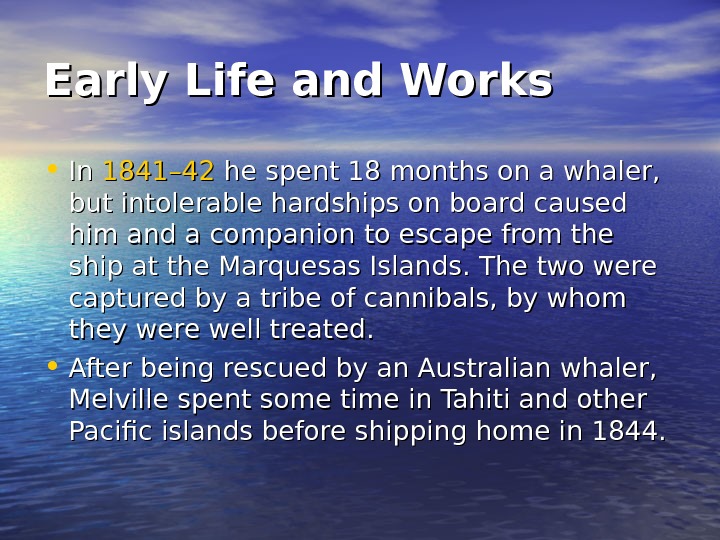
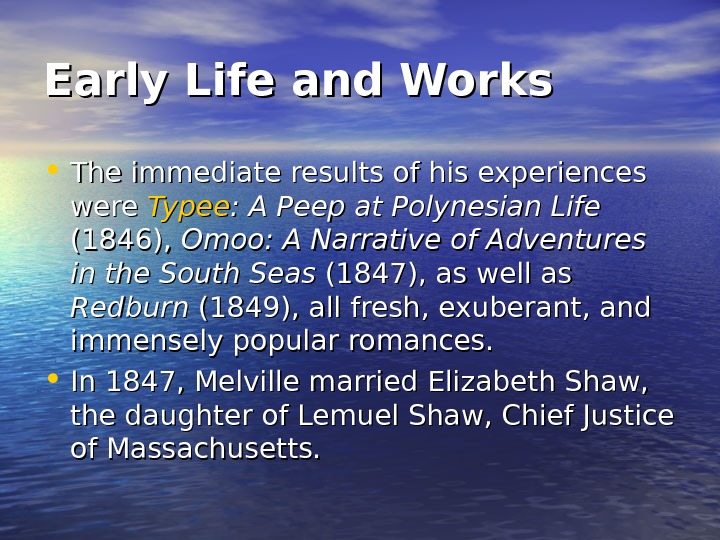
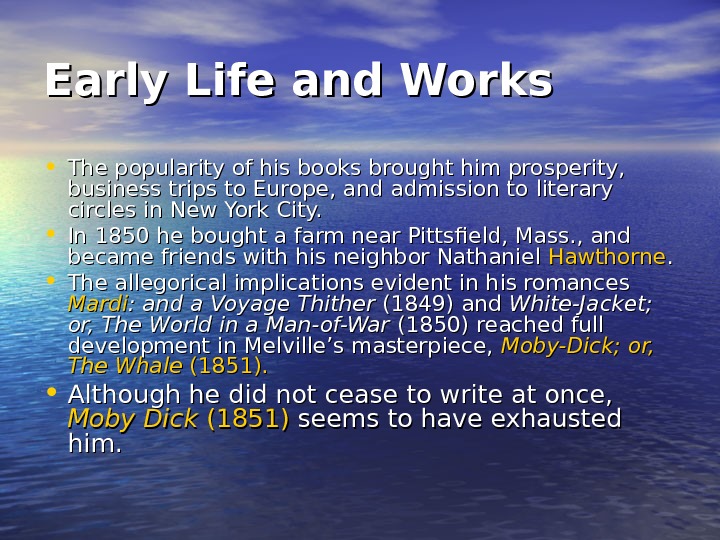
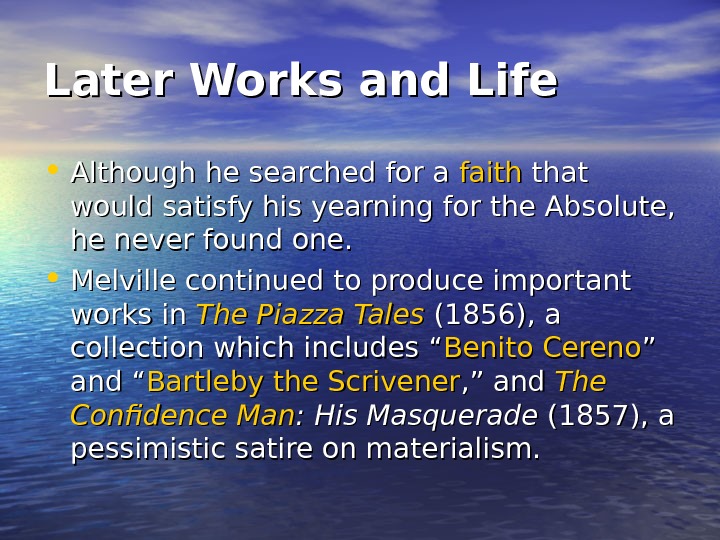
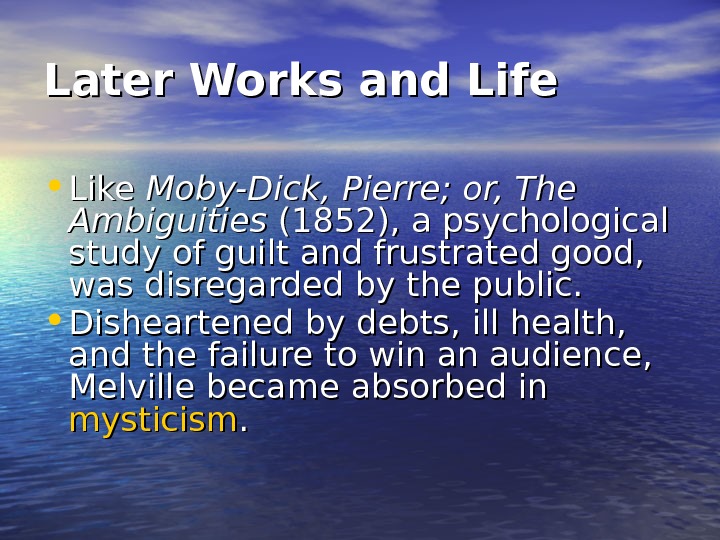
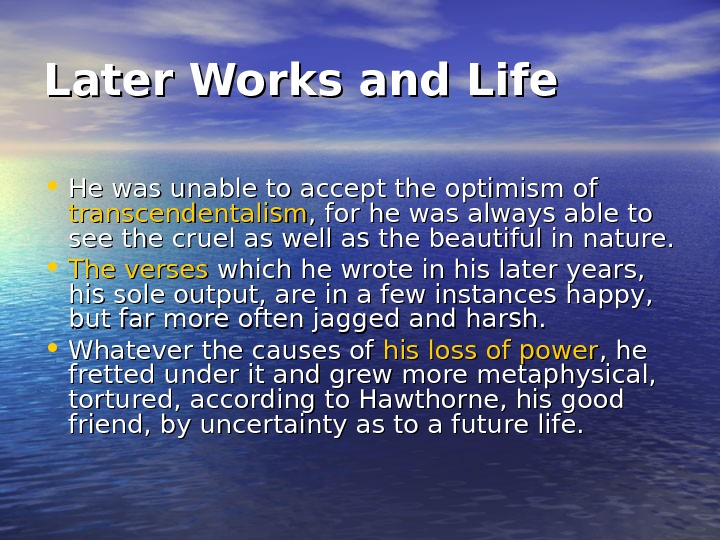
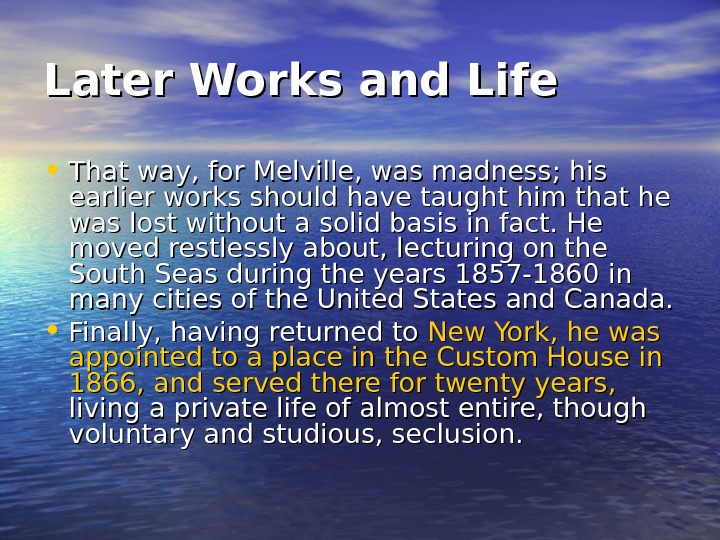
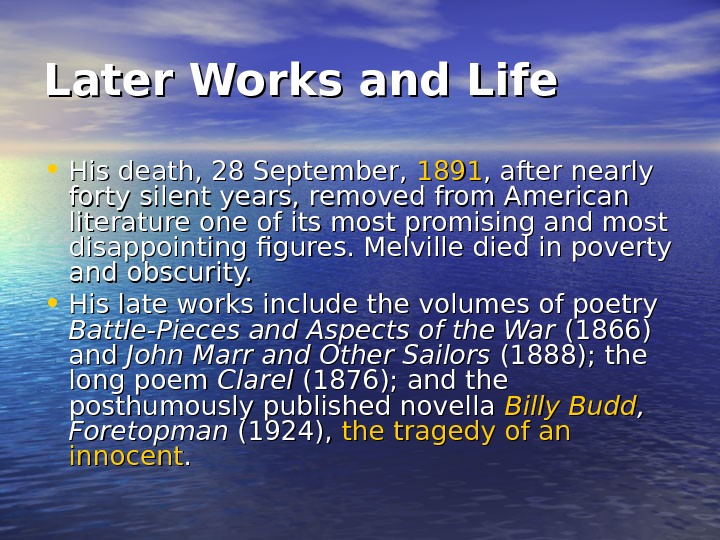
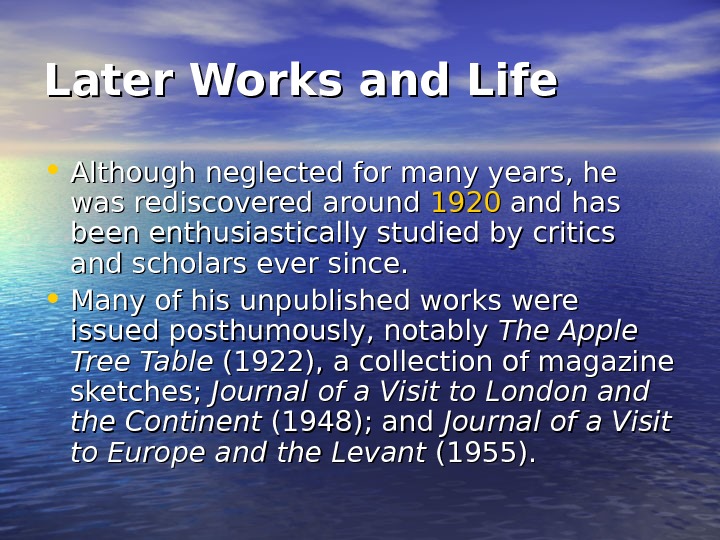
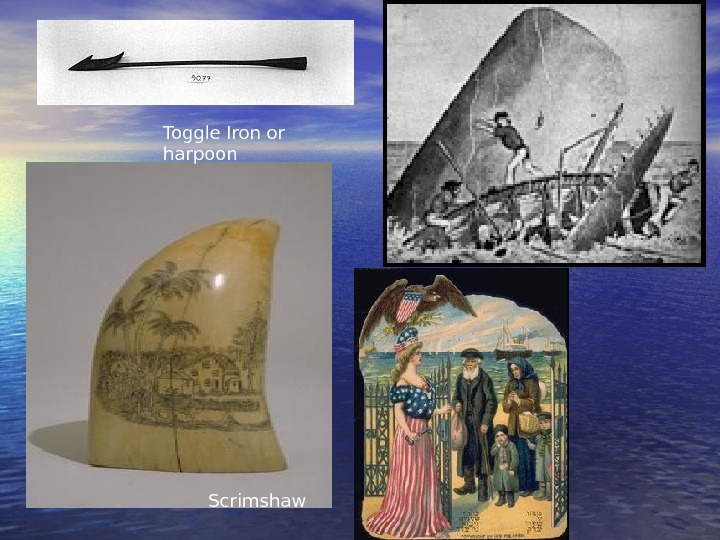
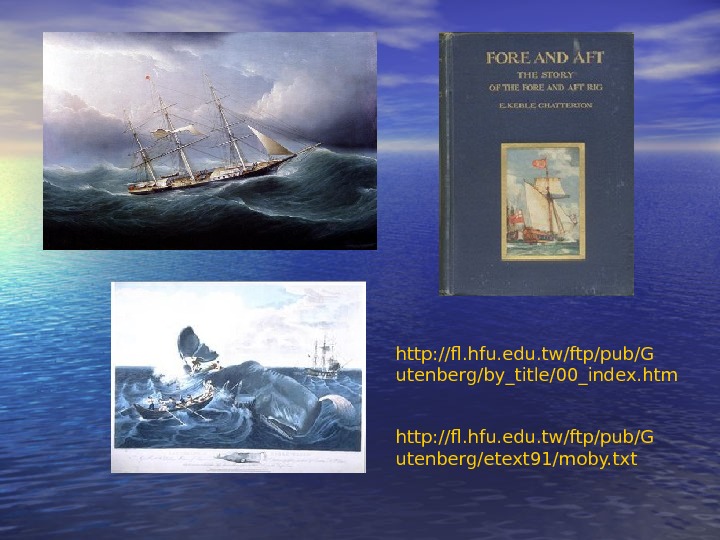
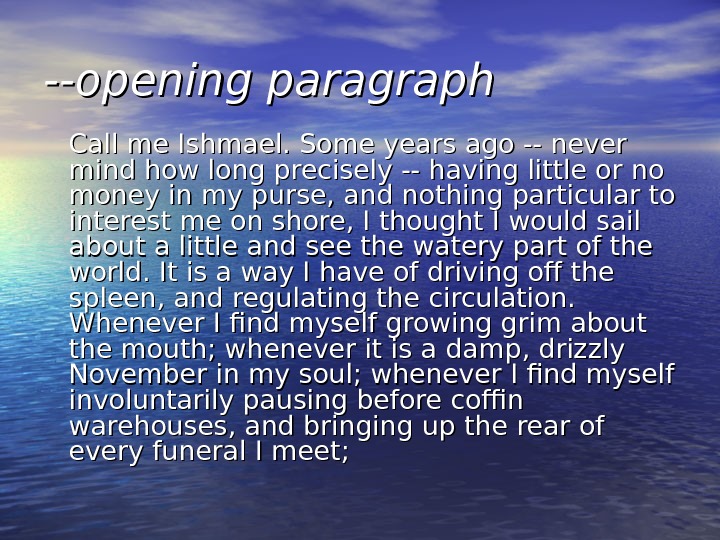
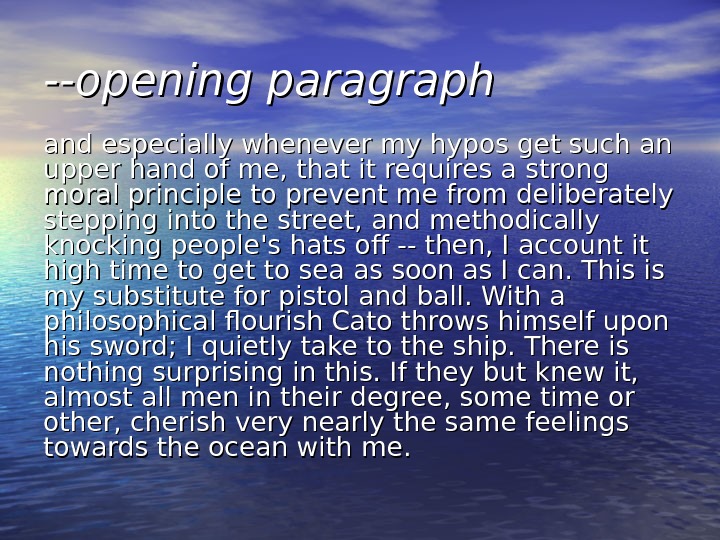
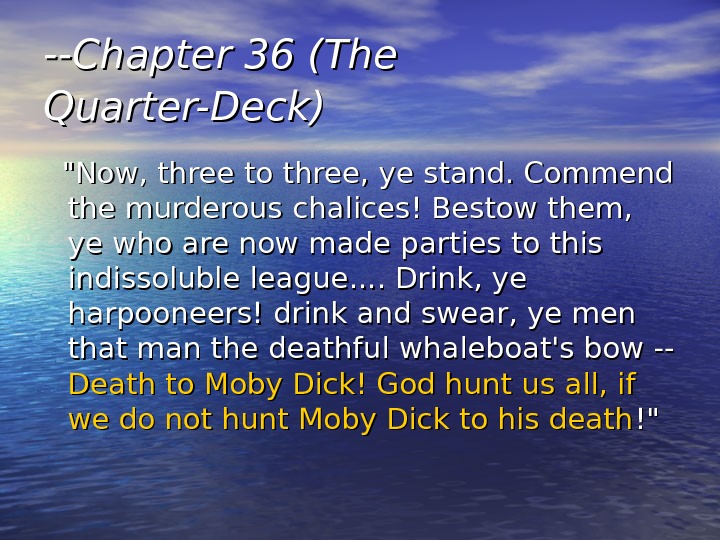
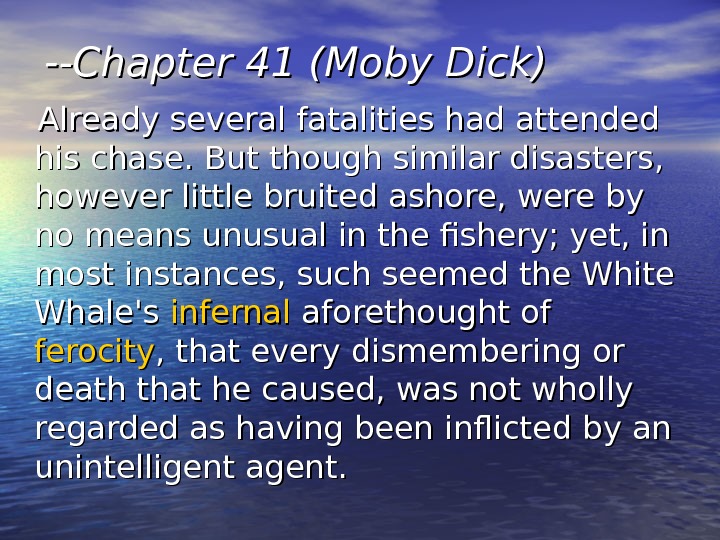
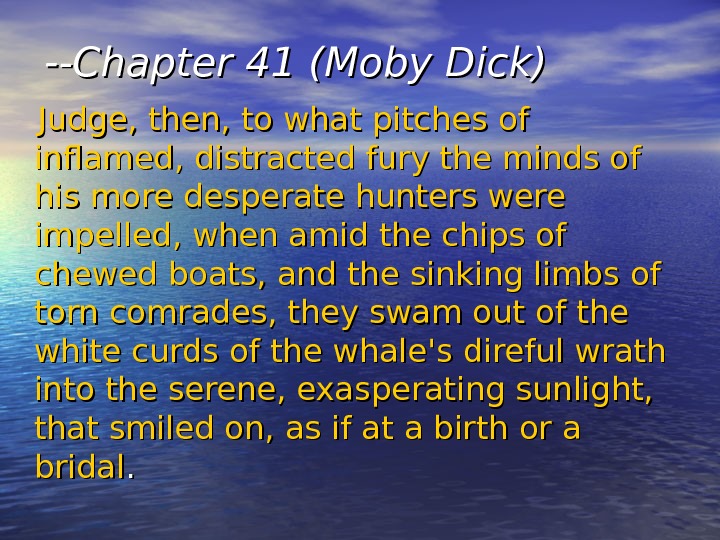
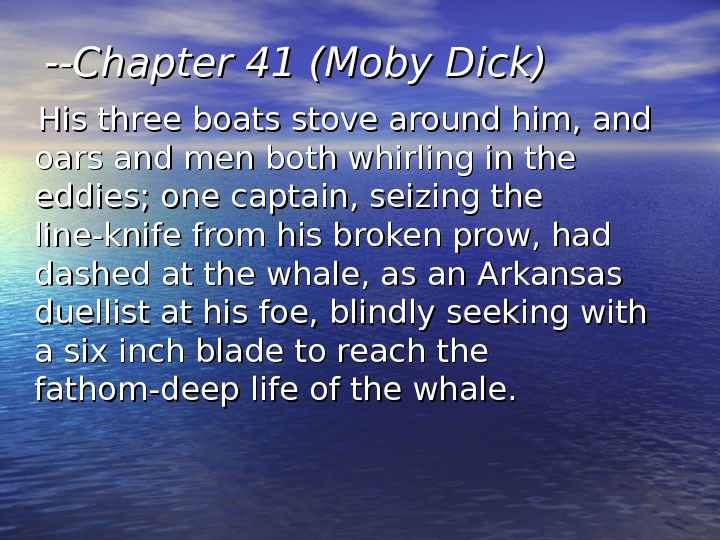
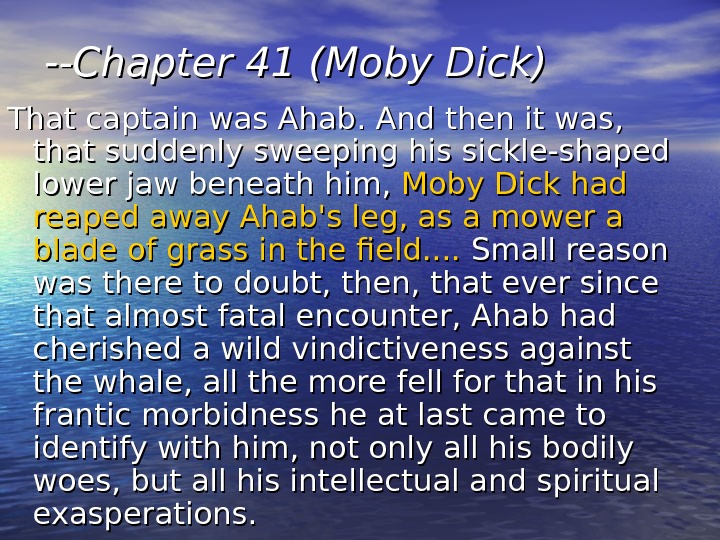
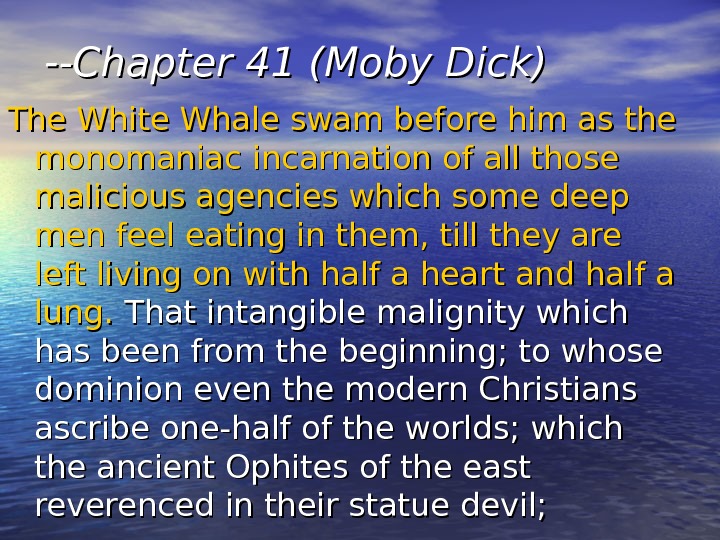
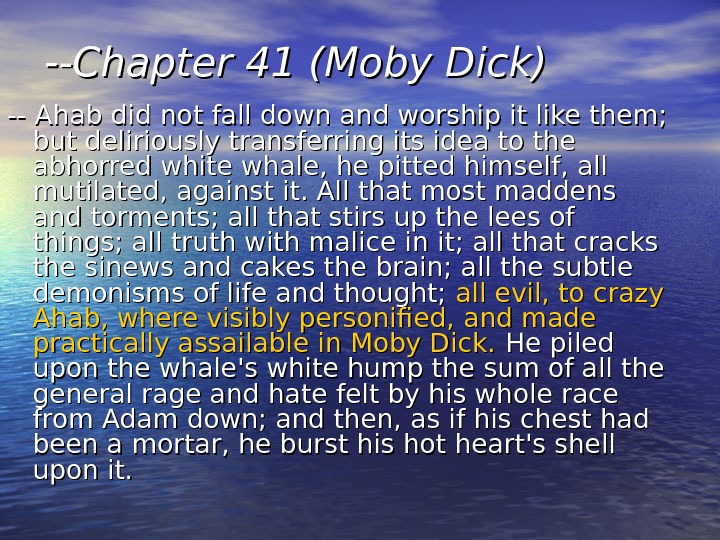
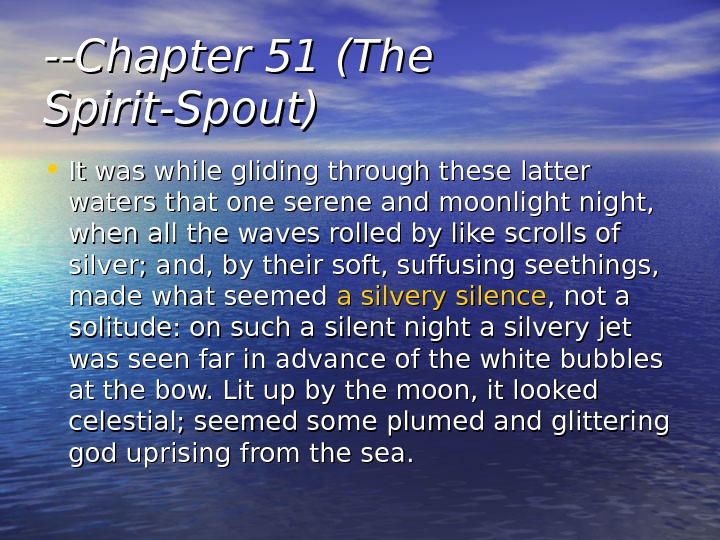
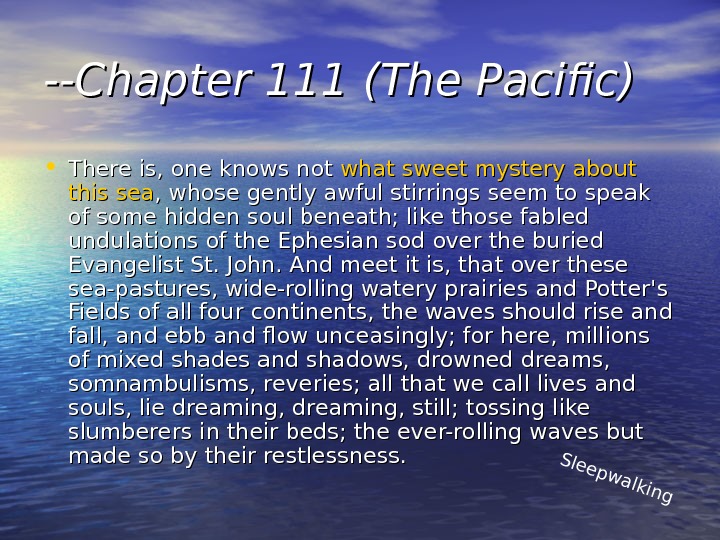
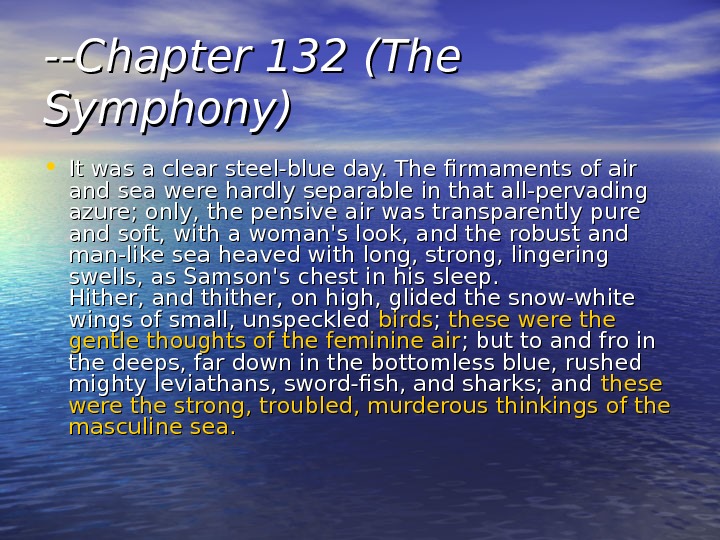
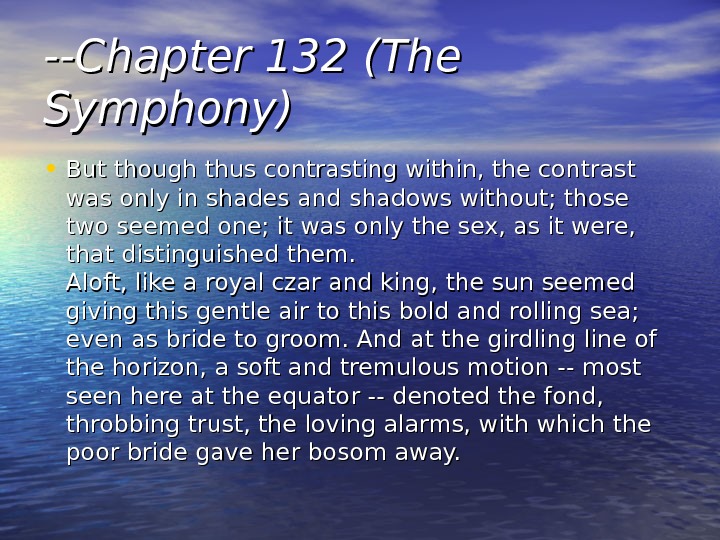
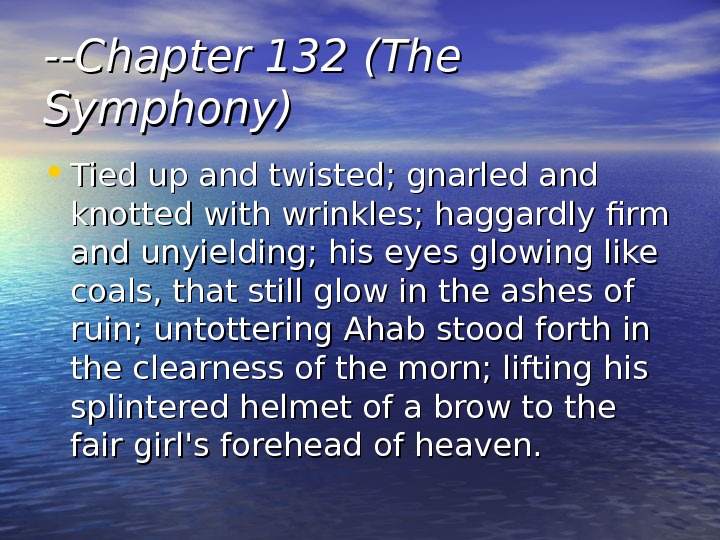

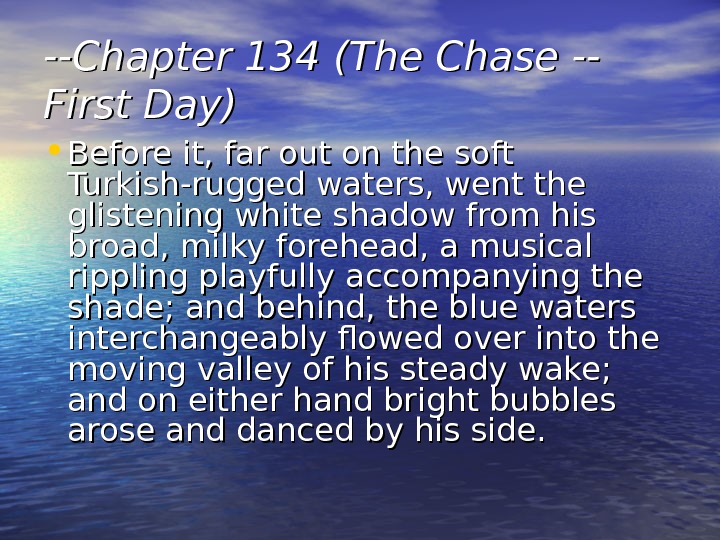
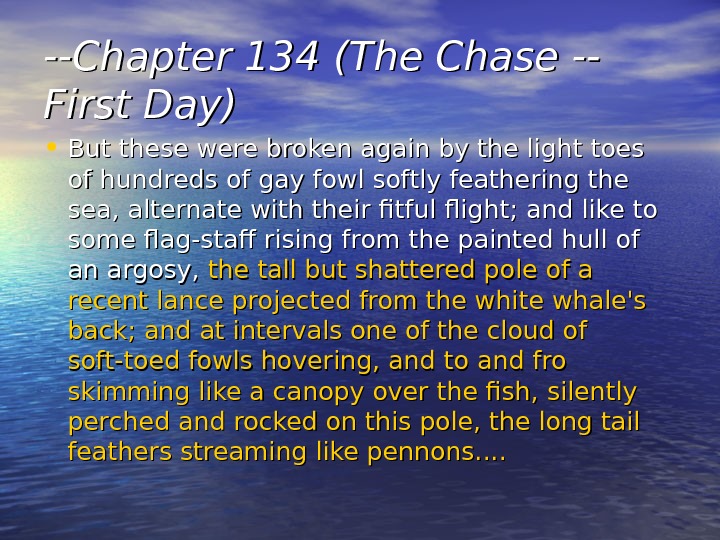
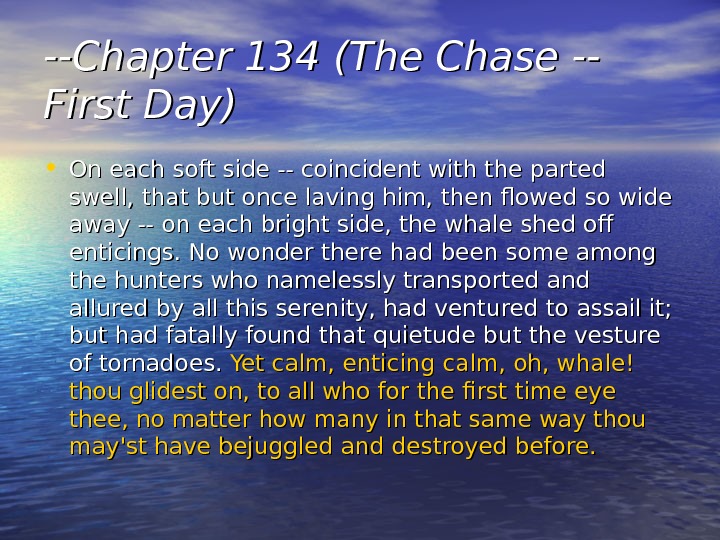
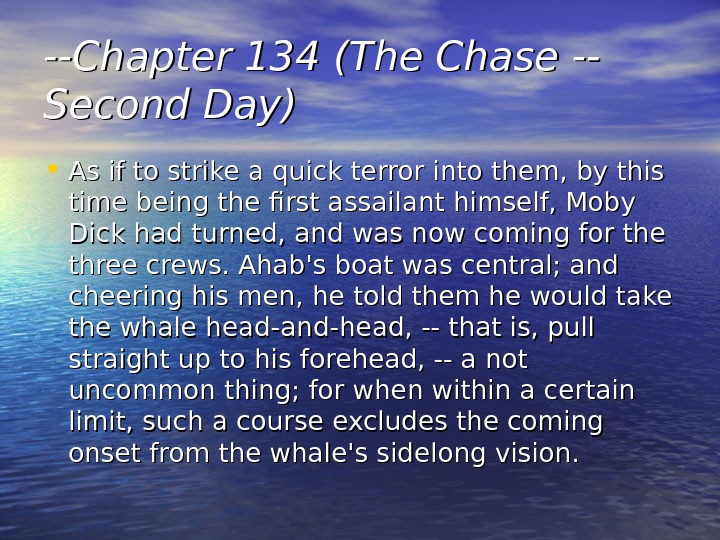
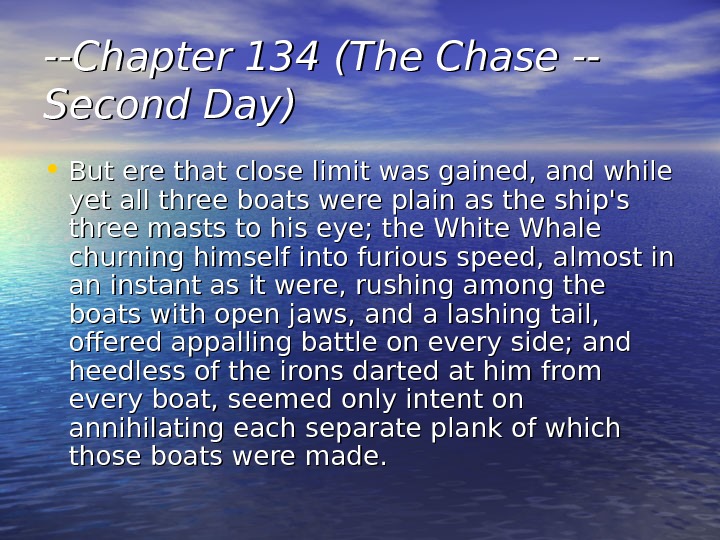
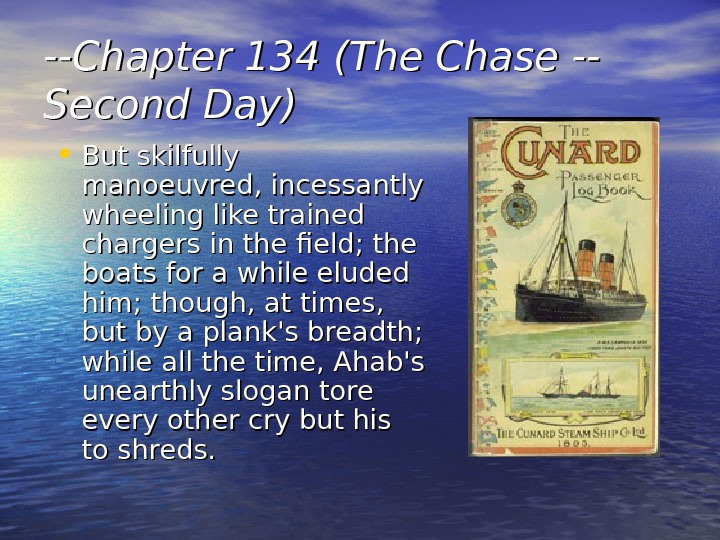
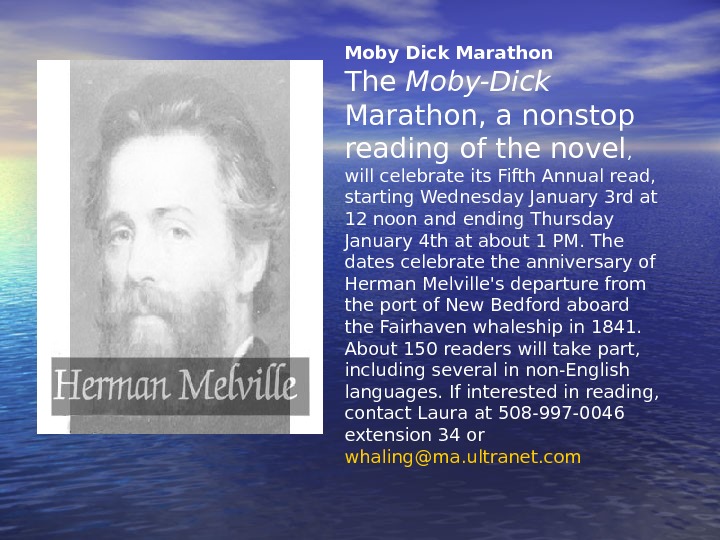
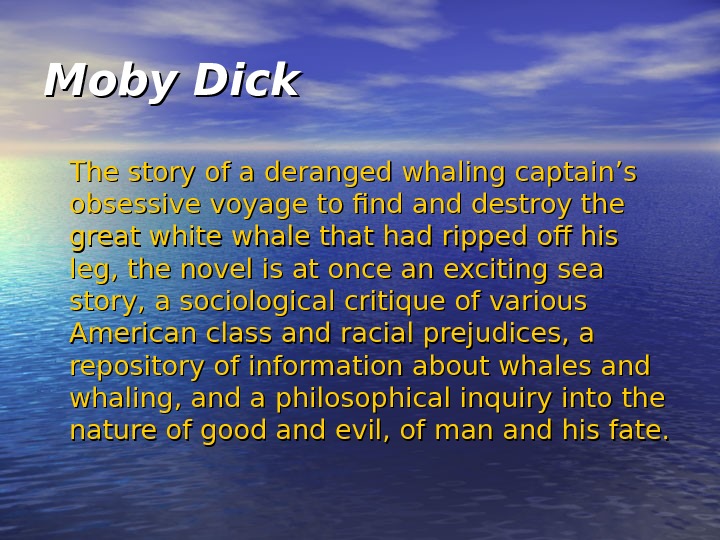
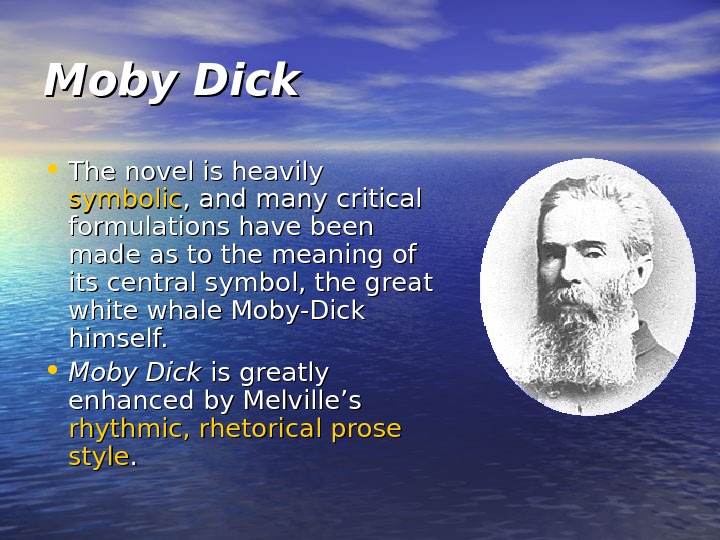
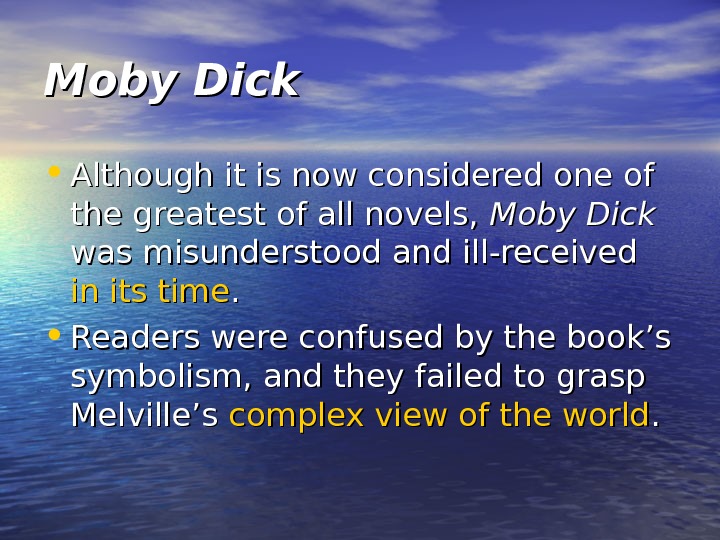
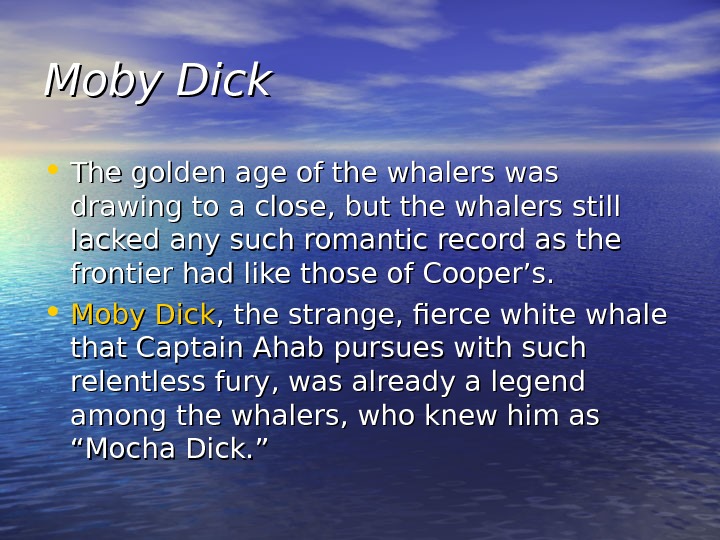
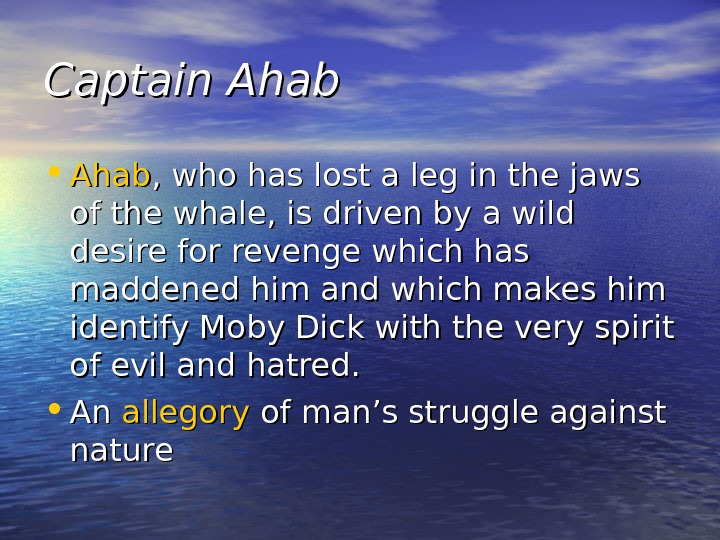
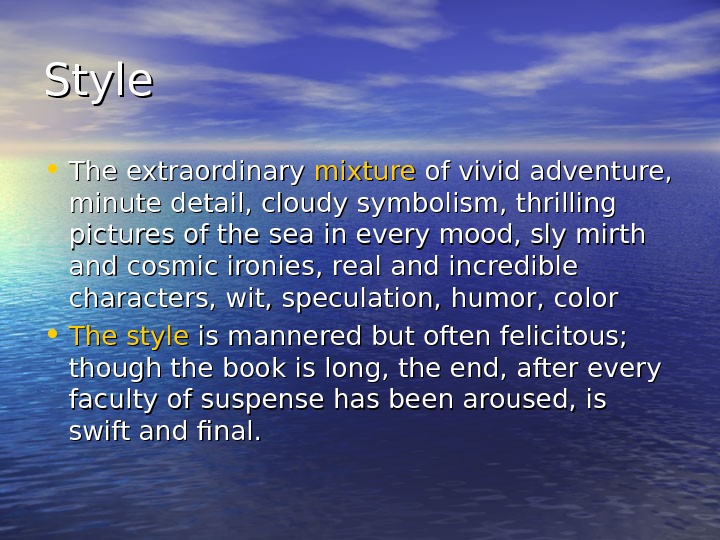
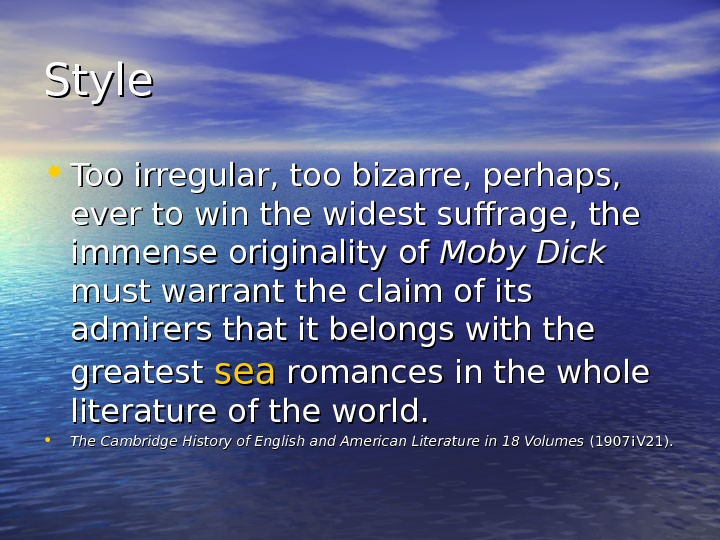
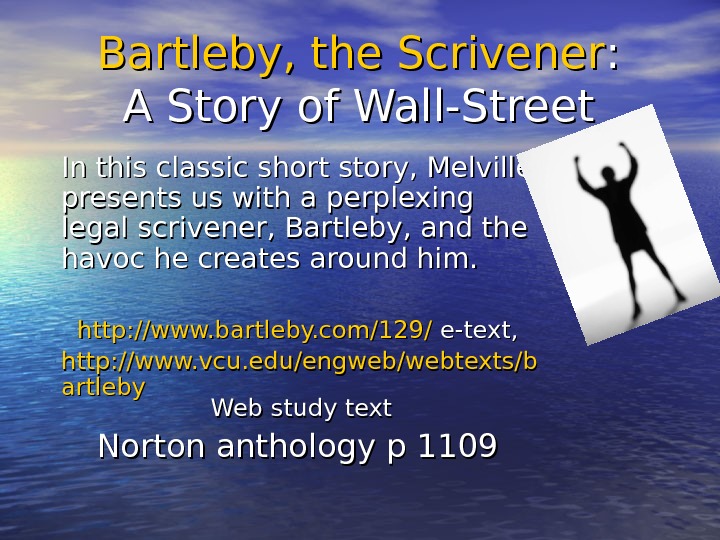
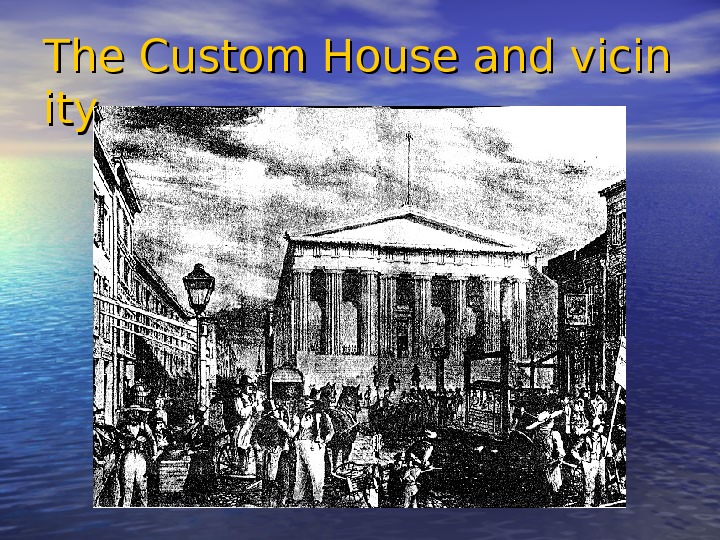
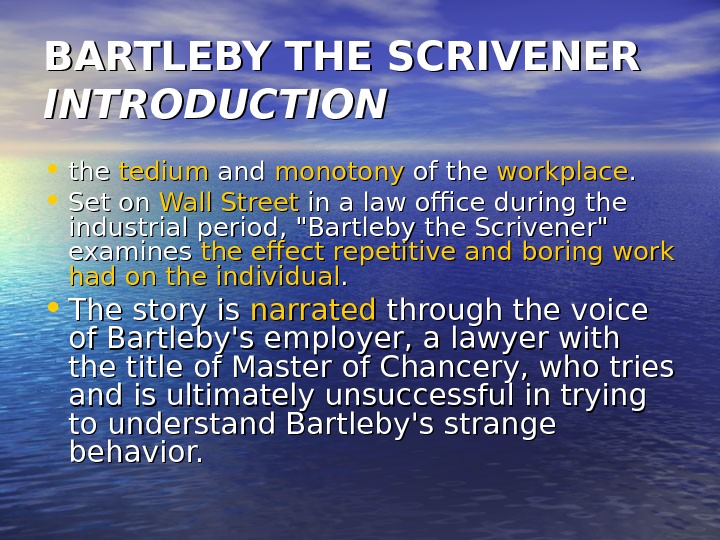
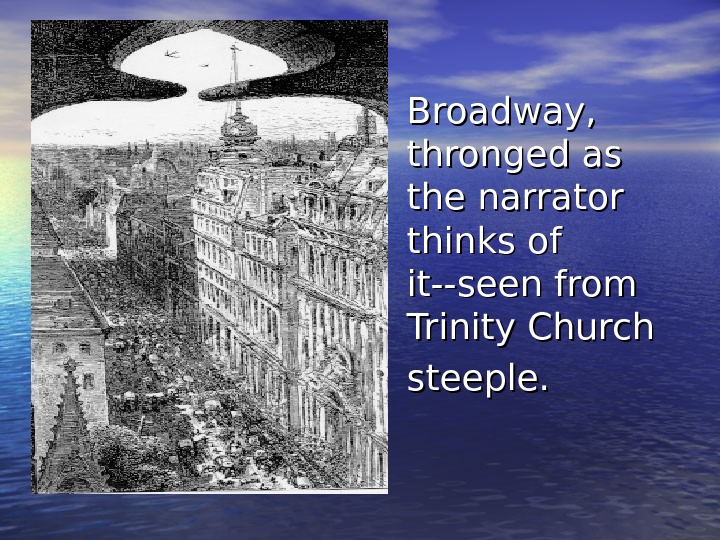
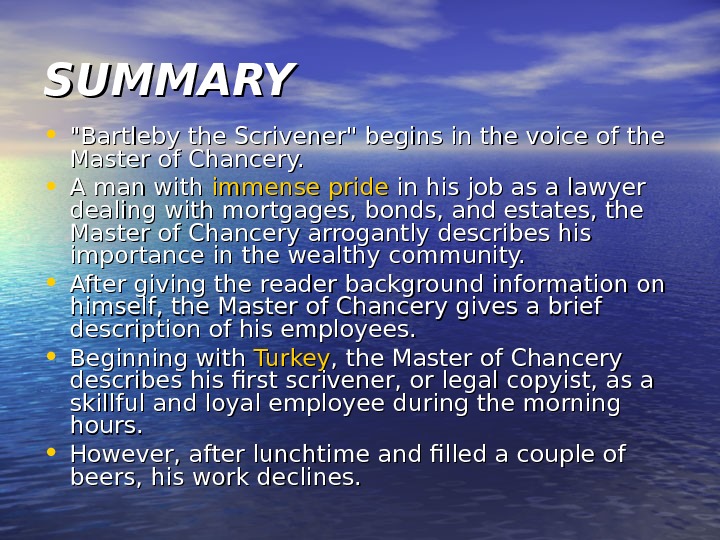
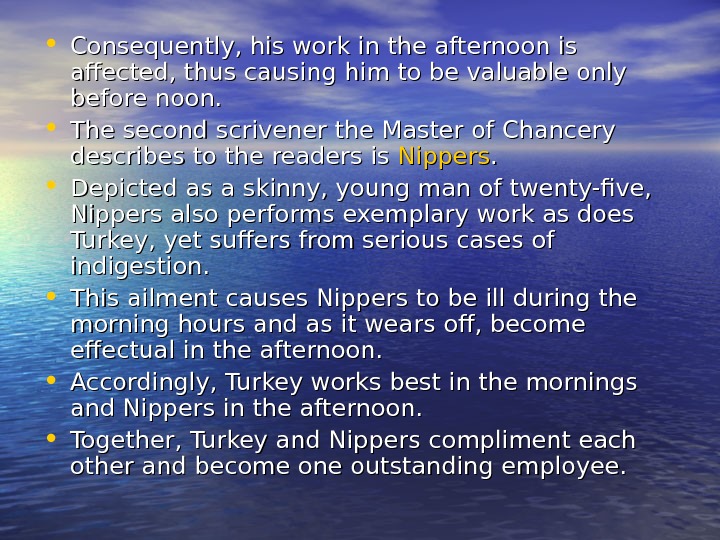
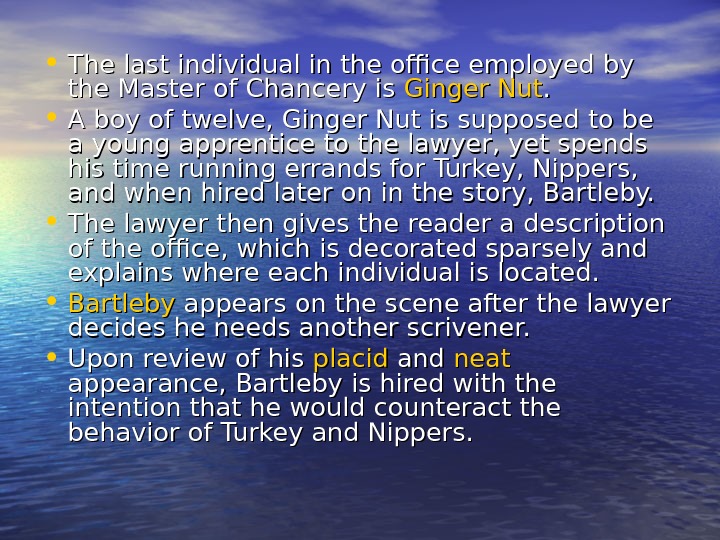
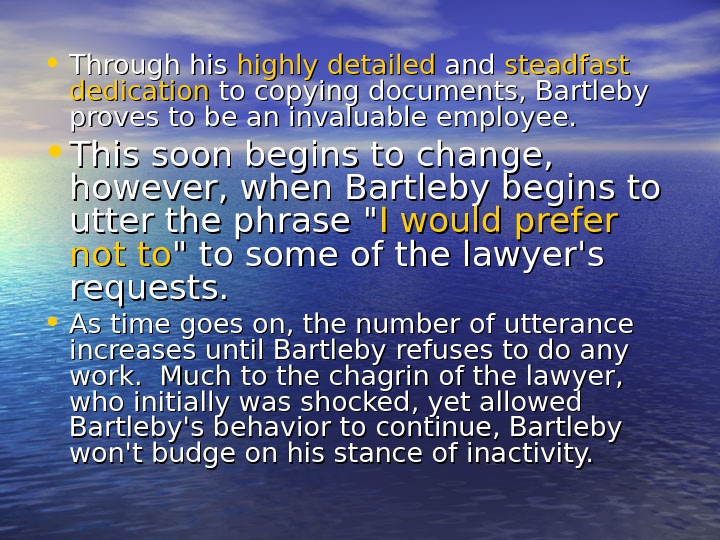
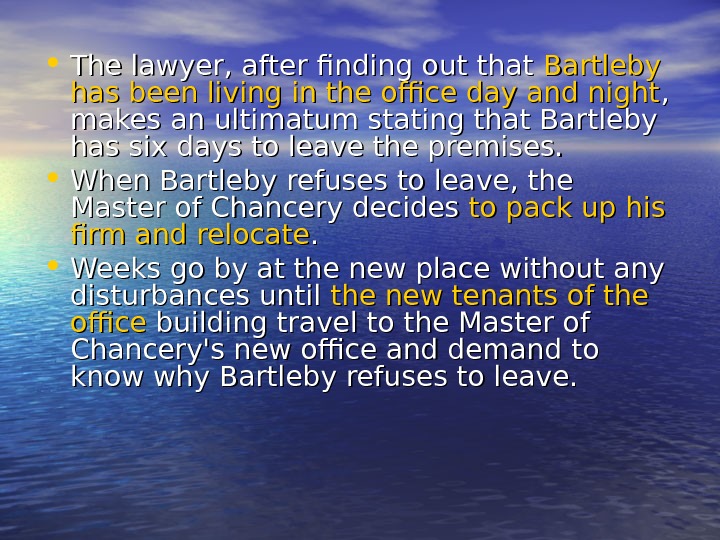
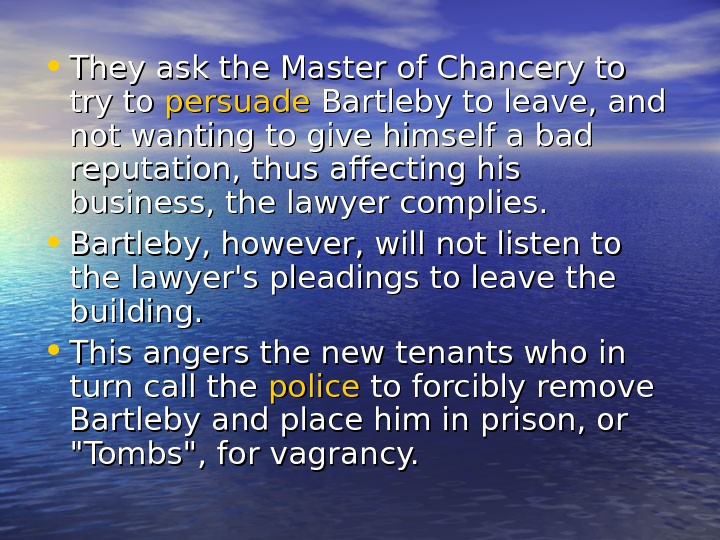
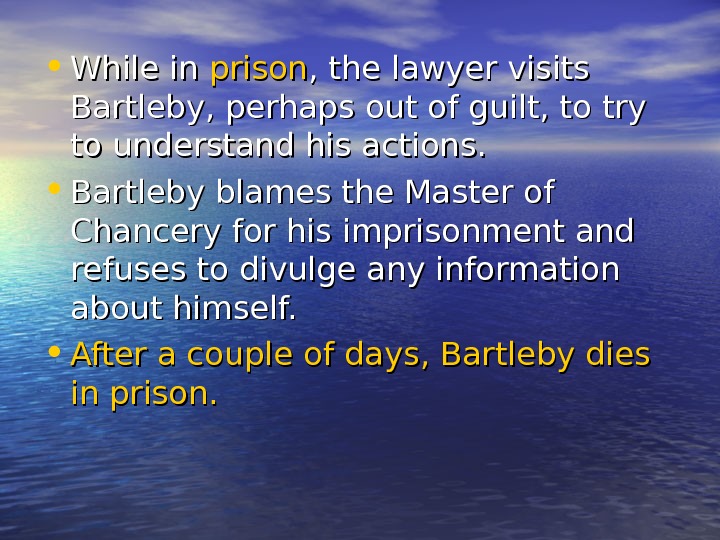
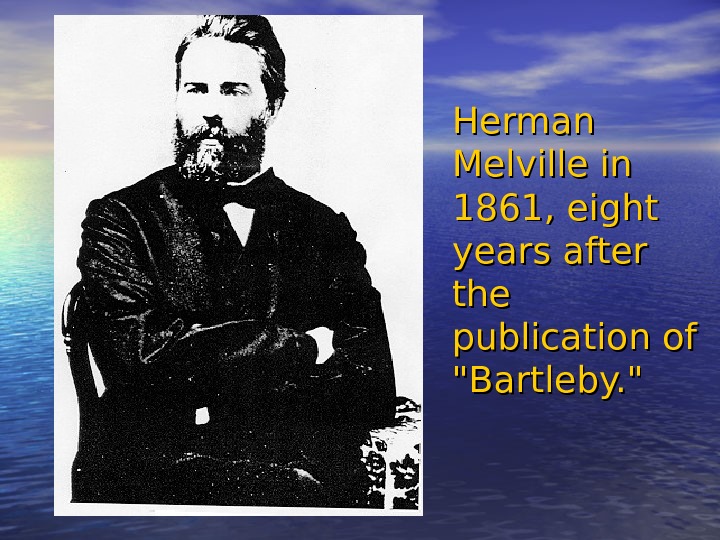
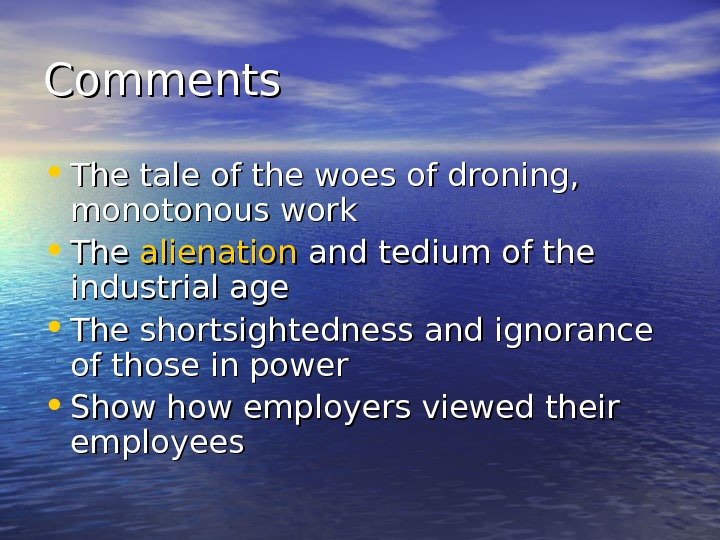
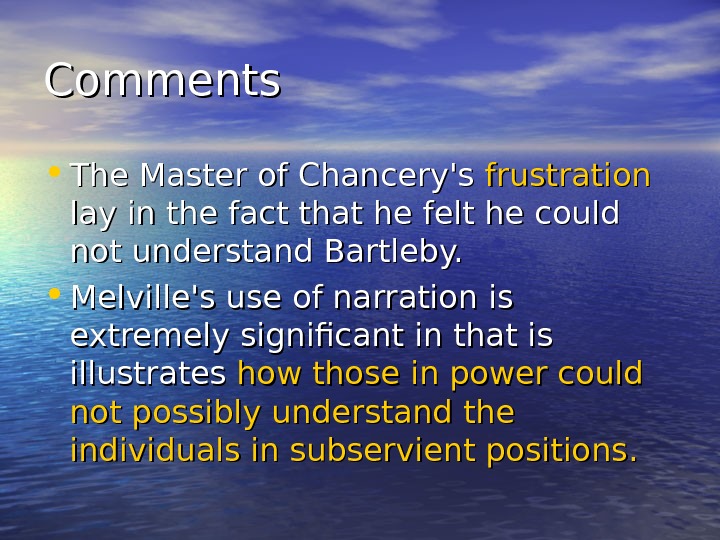
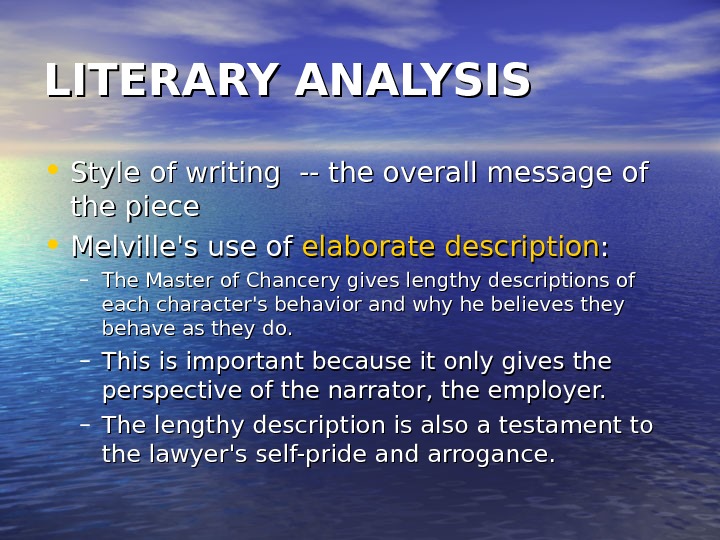
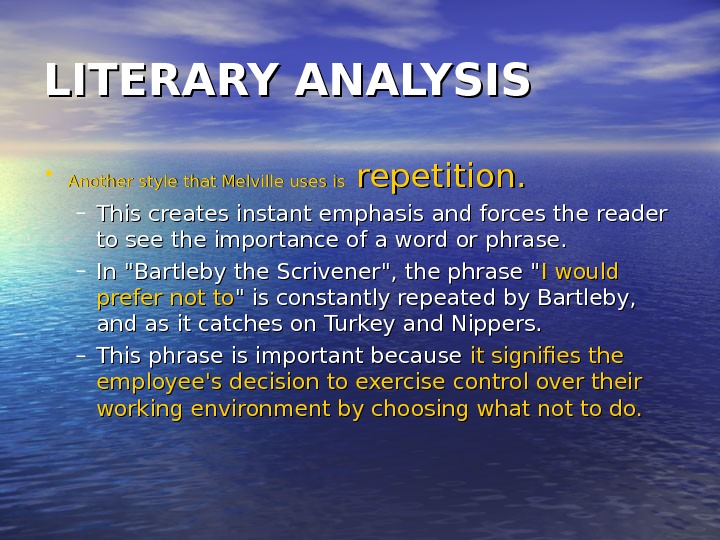
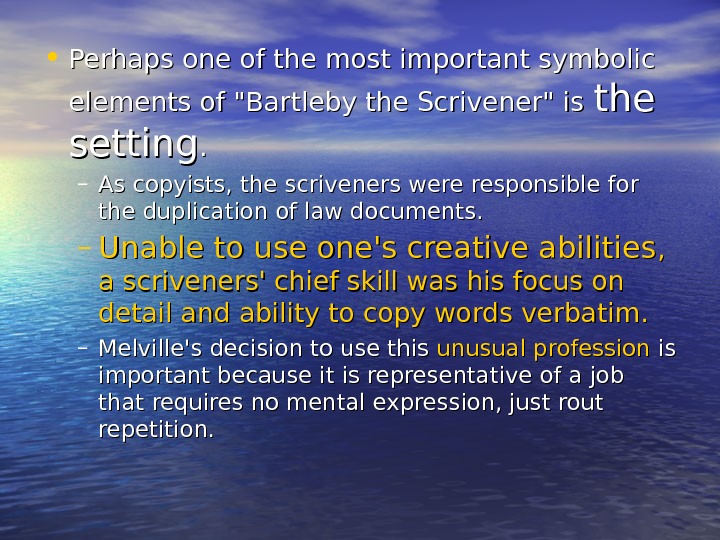
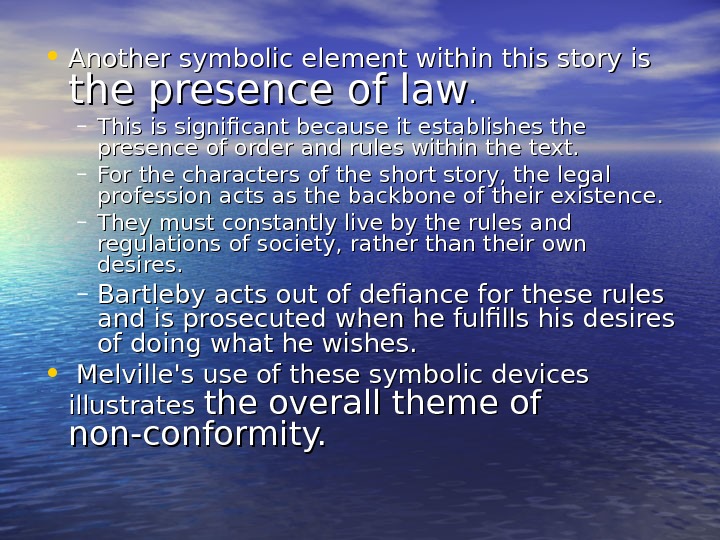
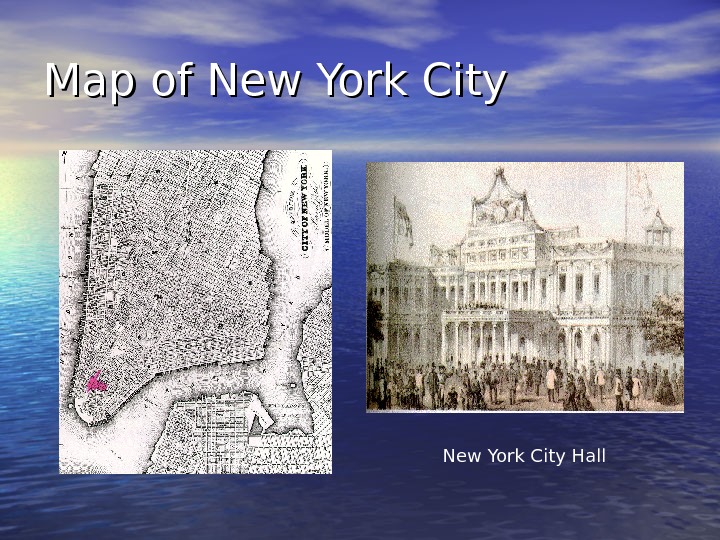
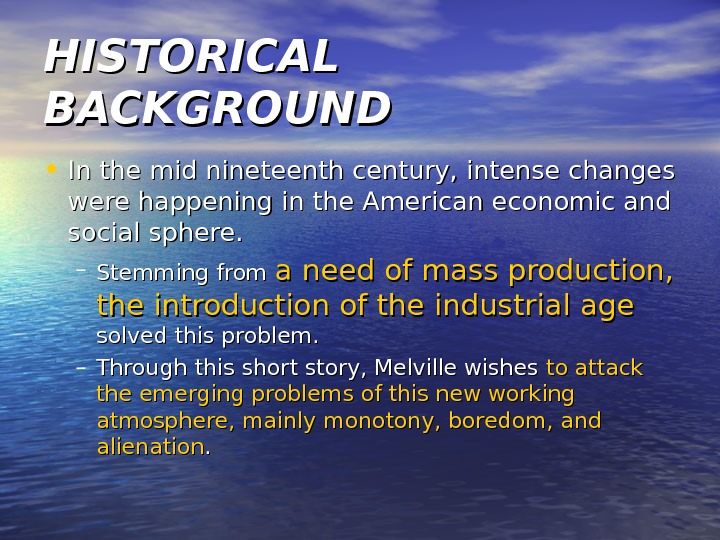
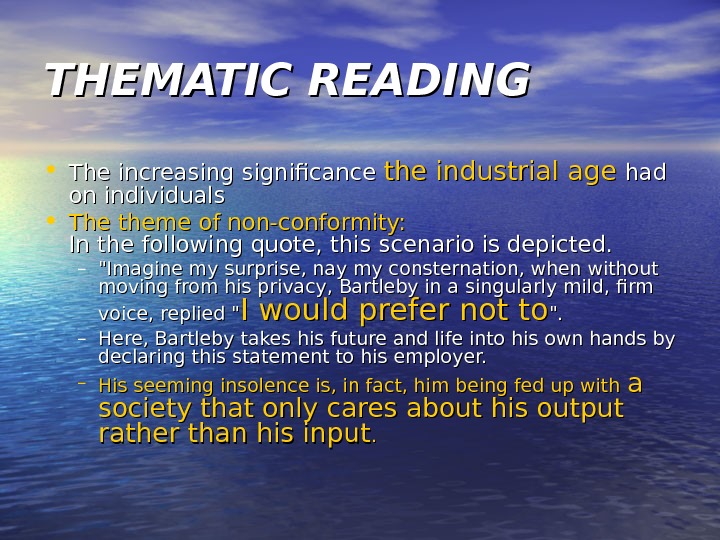
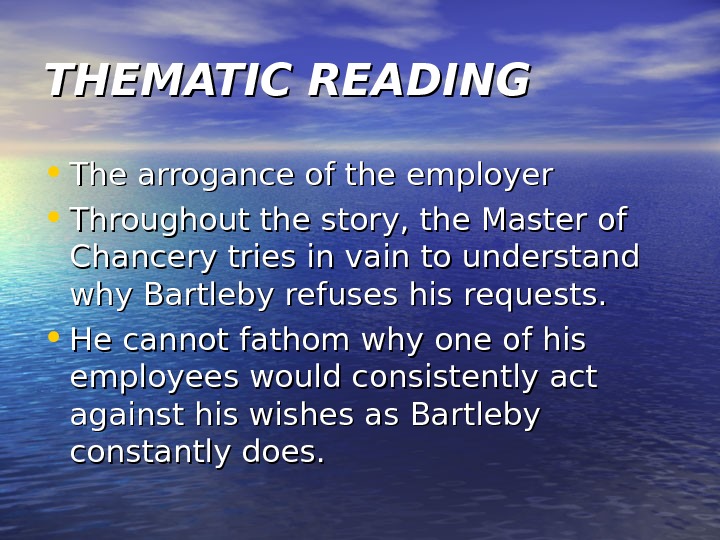
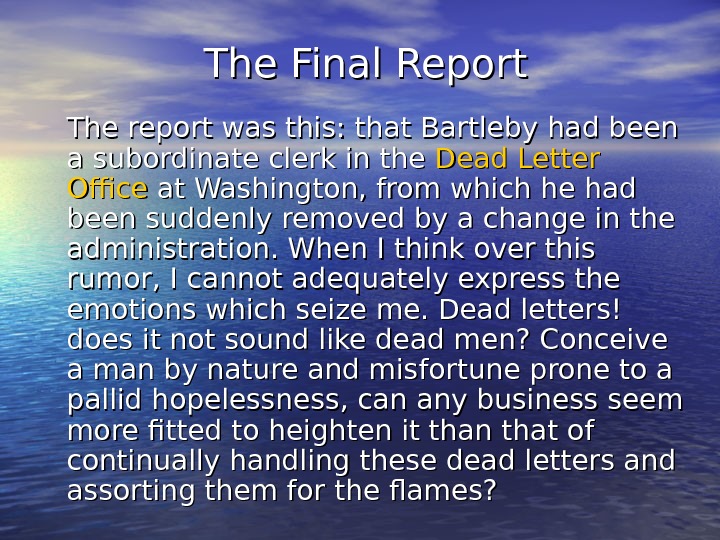
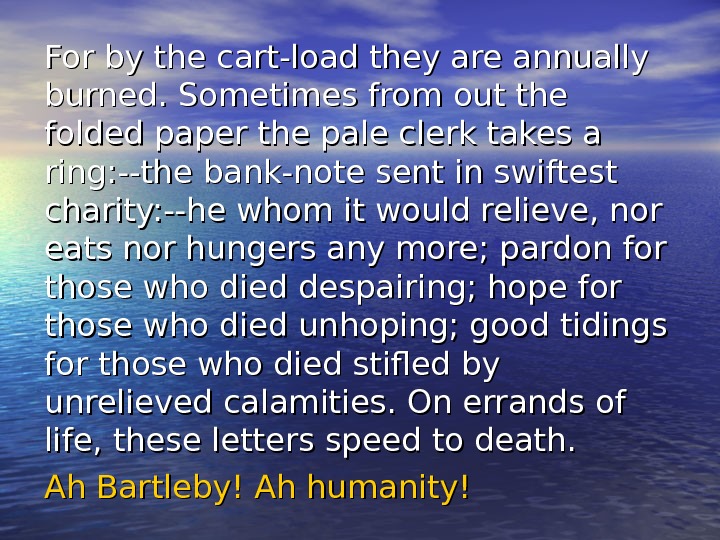
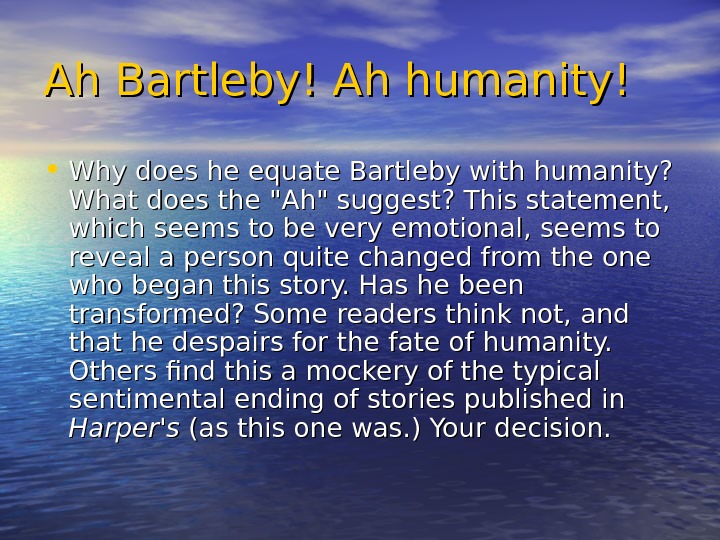
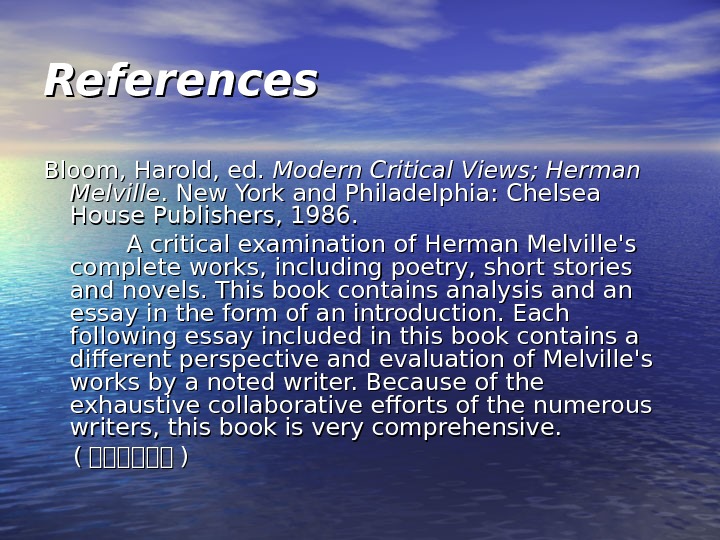
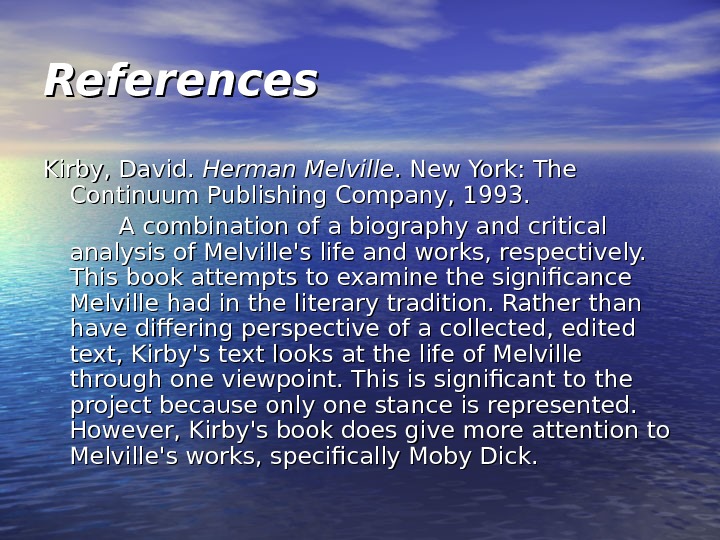
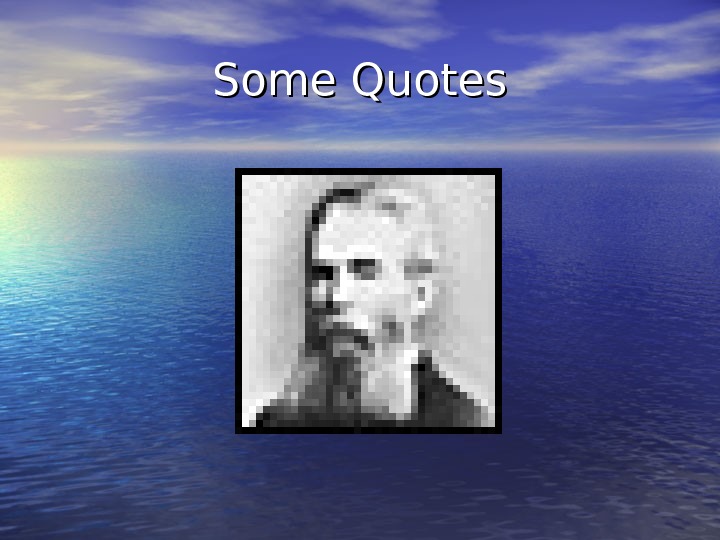
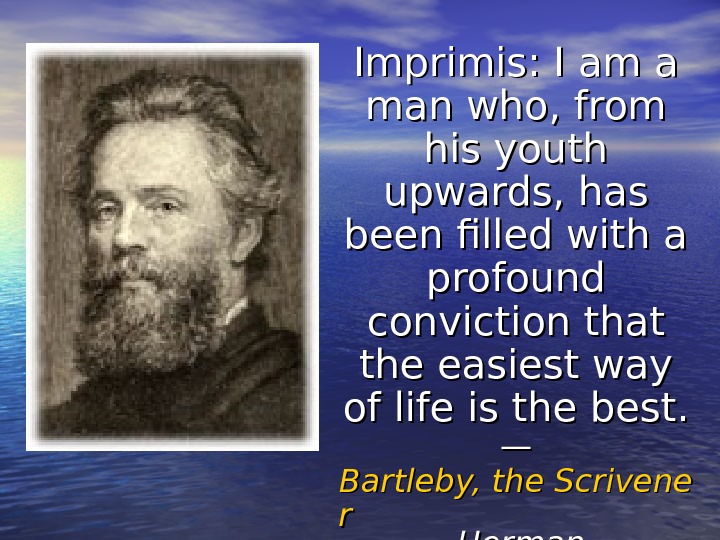
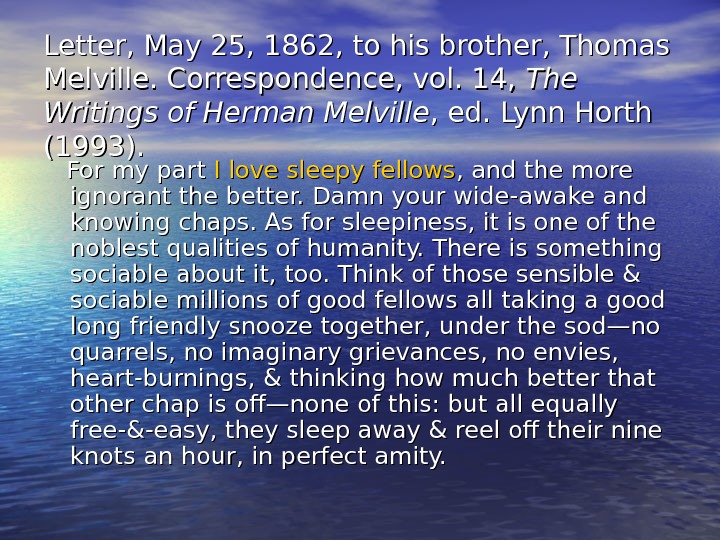
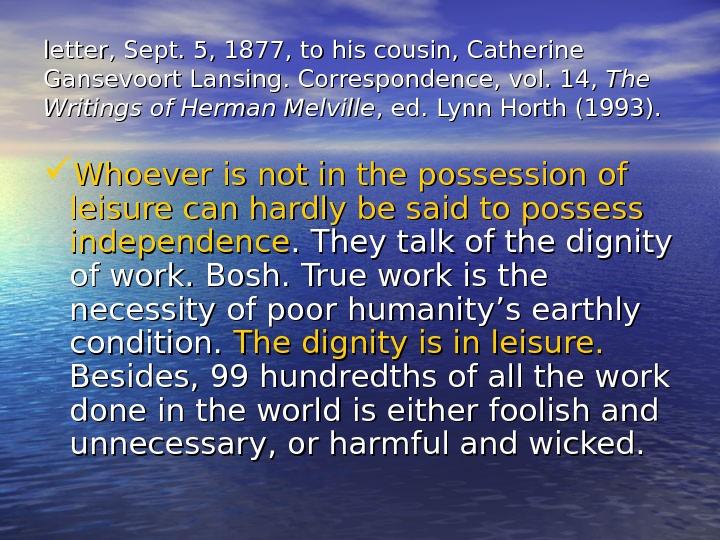
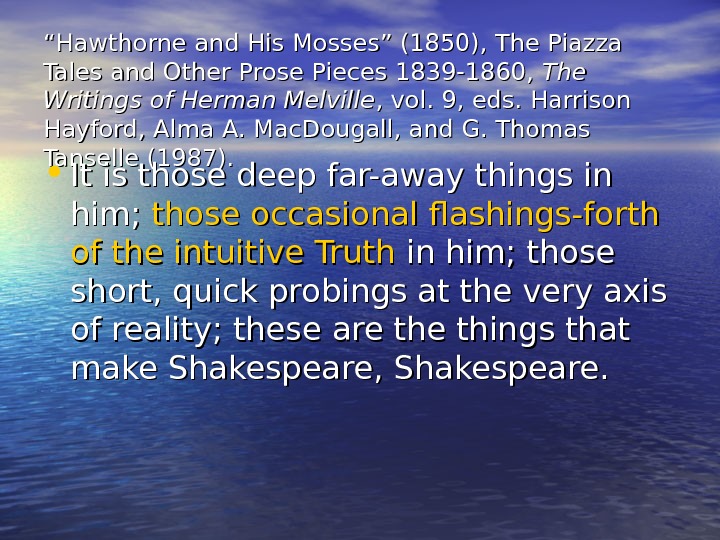
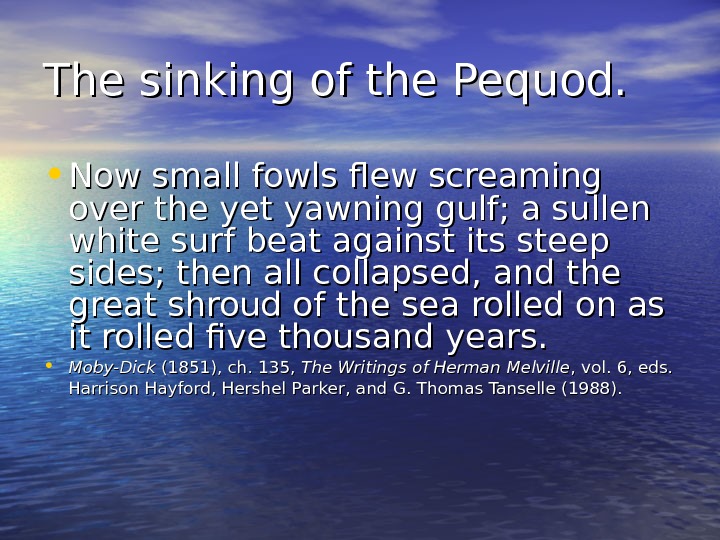
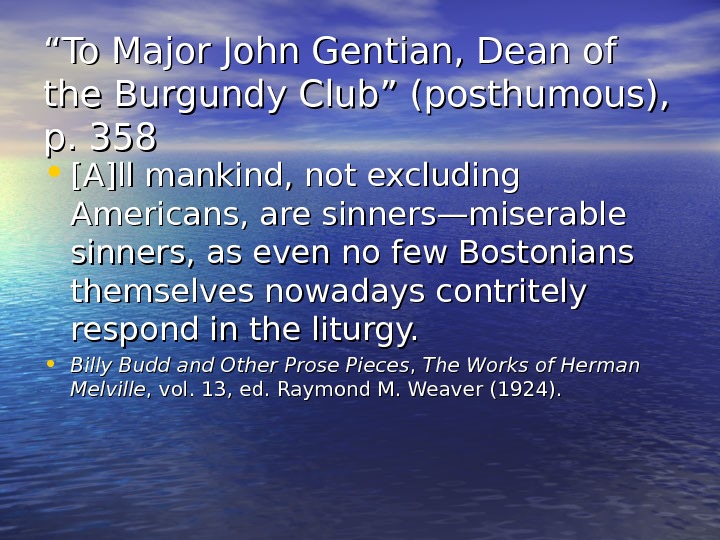
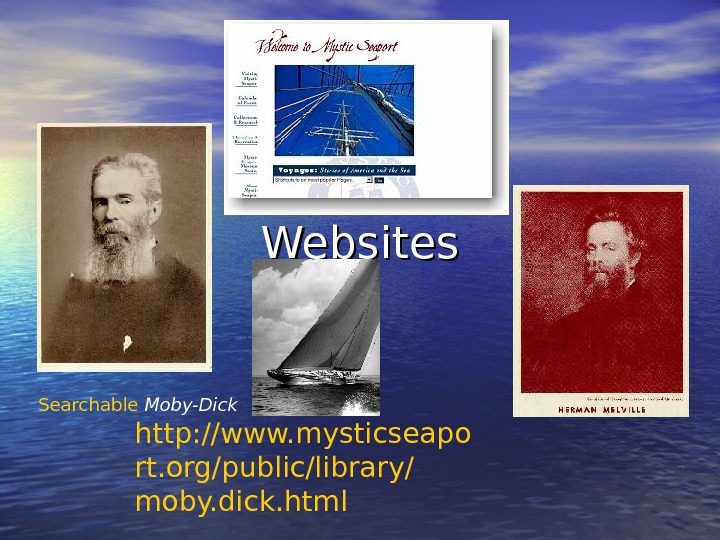
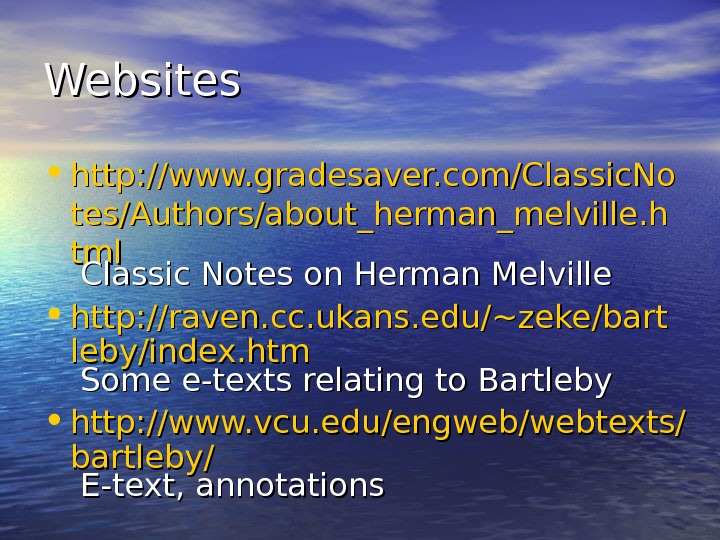
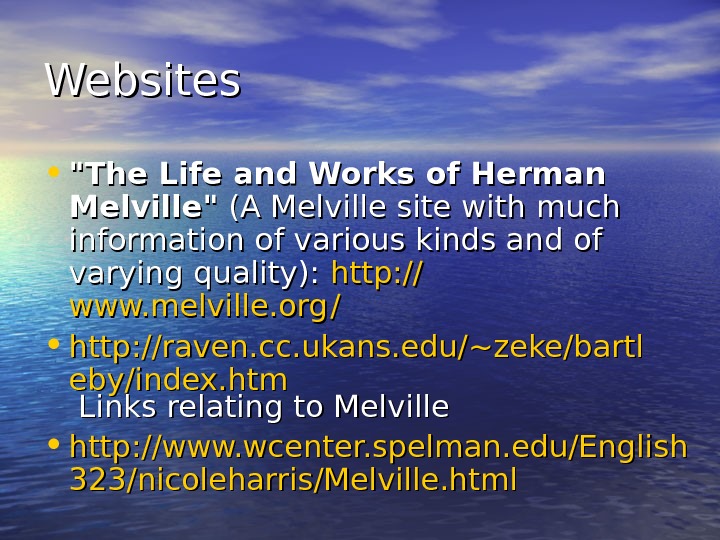
- Размер: 1.5 Mегабайта
- Количество слайдов: 80
Описание презентации Melville, Herman 1819– 91, American по слайдам
 Melville, Herman 1819– 91, American author, b. New York City, considered one of the great American writers and a major figure in world literature.
Melville, Herman 1819– 91, American author, b. New York City, considered one of the great American writers and a major figure in world literature.
 Week 6 -7 • Life • Moby-Dick • Bartleby • Quotes • References • Websites
Week 6 -7 • Life • Moby-Dick • Bartleby • Quotes • References • Websites
 Early Life and Works • Born into an impoverished family of distinguished Dutch and English colonial descent, Melville was 12 when his father died. • He left school at 15 , worked at a variety of jobs, and in 1839 signed on as a cabin boy on a ship bound for Liverpool, an experience reflected in his romance Redburn.
Early Life and Works • Born into an impoverished family of distinguished Dutch and English colonial descent, Melville was 12 when his father died. • He left school at 15 , worked at a variety of jobs, and in 1839 signed on as a cabin boy on a ship bound for Liverpool, an experience reflected in his romance Redburn.
 Early Life and Works • In In 1841– 42 he spent 18 months on a whaler, but intolerable hardships on board caused him and a companion to escape from the ship at the Marquesas Islands. The two were captured by a tribe of cannibals, by whom they were well treated. • After being rescued by an Australian whaler, Melville spent some time in Tahiti and other Pacific islands before shipping home in 1844.
Early Life and Works • In In 1841– 42 he spent 18 months on a whaler, but intolerable hardships on board caused him and a companion to escape from the ship at the Marquesas Islands. The two were captured by a tribe of cannibals, by whom they were well treated. • After being rescued by an Australian whaler, Melville spent some time in Tahiti and other Pacific islands before shipping home in 1844.
 Early Life and Works • The immediate results of his experiences were Typee : A Peep at Polynesian Life (1846), Omoo: A Narrative of Adventures in the South Seas (1847), as well as Redburn (1849), all fresh, exuberant, and immensely popular romances. • In 1847, Melville married Elizabeth Shaw, the daughter of Lemuel Shaw, Chief Justice of Massachusetts.
Early Life and Works • The immediate results of his experiences were Typee : A Peep at Polynesian Life (1846), Omoo: A Narrative of Adventures in the South Seas (1847), as well as Redburn (1849), all fresh, exuberant, and immensely popular romances. • In 1847, Melville married Elizabeth Shaw, the daughter of Lemuel Shaw, Chief Justice of Massachusetts.
 Early Life and Works • The popularity of his books brought him prosperity, business trips to Europe, and admission to literary circles in New York City. • In 1850 he bought a farm near Pittsfield, Mass. , and became friends with his neighbor Nathaniel Hawthorne. . • The allegorical implications evident in his romances Mardi : and a Voyage Thither (1849) and White-Jacket; or, The World in a Man-of-War (1850) reached full development in Melville’s masterpiece, Moby-Dick; or, The Whale (1851). • Although he did not cease to write at once, Moby Dick (1851) seems to have exhausted him.
Early Life and Works • The popularity of his books brought him prosperity, business trips to Europe, and admission to literary circles in New York City. • In 1850 he bought a farm near Pittsfield, Mass. , and became friends with his neighbor Nathaniel Hawthorne. . • The allegorical implications evident in his romances Mardi : and a Voyage Thither (1849) and White-Jacket; or, The World in a Man-of-War (1850) reached full development in Melville’s masterpiece, Moby-Dick; or, The Whale (1851). • Although he did not cease to write at once, Moby Dick (1851) seems to have exhausted him.
 Later Works and Life • Although he searched for a faith that would satisfy his yearning for the Absolute, he never found one. • Melville continued to produce important works in The Piazza Tales (1856), a collection which includes “ Benito Cereno ” ” and “ Bartleby the Scrivener , ” and The Confidence Man : His Masquerade (1857), a pessimistic satire on materialism.
Later Works and Life • Although he searched for a faith that would satisfy his yearning for the Absolute, he never found one. • Melville continued to produce important works in The Piazza Tales (1856), a collection which includes “ Benito Cereno ” ” and “ Bartleby the Scrivener , ” and The Confidence Man : His Masquerade (1857), a pessimistic satire on materialism.
 Later Works and Life • Like Moby-Dick, Pierre; or, The Ambiguities (1852), a psychological study of guilt and frustrated good, was disregarded by the public. • Disheartened by debts, ill health, and the failure to win an audience, Melville became absorbed in mysticism. .
Later Works and Life • Like Moby-Dick, Pierre; or, The Ambiguities (1852), a psychological study of guilt and frustrated good, was disregarded by the public. • Disheartened by debts, ill health, and the failure to win an audience, Melville became absorbed in mysticism. .
 Later Works and Life • He was unable to accept the optimism of transcendentalism , for he was always able to see the cruel as well as the beautiful in nature. • The verses which he wrote in his later years, his sole output, are in a few instances happy, but far more often jagged and harsh. • Whatever the causes of his loss of power , he fretted under it and grew more metaphysical, tortured, according to Hawthorne, his good friend, by uncertainty as to a future life.
Later Works and Life • He was unable to accept the optimism of transcendentalism , for he was always able to see the cruel as well as the beautiful in nature. • The verses which he wrote in his later years, his sole output, are in a few instances happy, but far more often jagged and harsh. • Whatever the causes of his loss of power , he fretted under it and grew more metaphysical, tortured, according to Hawthorne, his good friend, by uncertainty as to a future life.
 Later Works and Life • That way, for Melville, was madness; his earlier works should have taught him that he was lost without a solid basis in fact. He moved restlessly about, lecturing on the South Seas during the years 1857 -1860 in many cities of the United States and Canada. • Finally, having returned to New York, he was appointed to a place in the Custom House in 1866, and served there for twenty years, living a private life of almost entire, though voluntary and studious, seclusion.
Later Works and Life • That way, for Melville, was madness; his earlier works should have taught him that he was lost without a solid basis in fact. He moved restlessly about, lecturing on the South Seas during the years 1857 -1860 in many cities of the United States and Canada. • Finally, having returned to New York, he was appointed to a place in the Custom House in 1866, and served there for twenty years, living a private life of almost entire, though voluntary and studious, seclusion.
 Later Works and Life • His death, 28 September, 1891 , after nearly forty silent years, removed from American literature one of its most promising and most disappointing figures. Melville died in poverty and obscurity. • His late works include the volumes of poetry Battle-Pieces and Aspects of the War (1866) and John Marr and Other Sailors (1888); the long poem Clarel (1876); and the posthumously published novella Billy Budd , , Foretopman (1924), the tragedy of an innocent. .
Later Works and Life • His death, 28 September, 1891 , after nearly forty silent years, removed from American literature one of its most promising and most disappointing figures. Melville died in poverty and obscurity. • His late works include the volumes of poetry Battle-Pieces and Aspects of the War (1866) and John Marr and Other Sailors (1888); the long poem Clarel (1876); and the posthumously published novella Billy Budd , , Foretopman (1924), the tragedy of an innocent. .
 Later Works and Life • Although neglected for many years, he was rediscovered around 1920 and has been enthusiastically studied by critics and scholars ever since. • Many of his unpublished works were issued posthumously, notably The Apple Tree Table (1922), a collection of magazine sketches; Journal of a Visit to London and the Continent (1948); and Journal of a Visit to Europe and the Levant (1955).
Later Works and Life • Although neglected for many years, he was rediscovered around 1920 and has been enthusiastically studied by critics and scholars ever since. • Many of his unpublished works were issued posthumously, notably The Apple Tree Table (1922), a collection of magazine sketches; Journal of a Visit to London and the Continent (1948); and Journal of a Visit to Europe and the Levant (1955).
 Scrimshaw Toggle Iron or harpoon
Scrimshaw Toggle Iron or harpoon
 http: //fl. hfu. edu. tw/ftp/pub/G utenberg/by_title/00_index. htm http: //fl. hfu. edu. tw/ftp/pub/G utenberg/etext 91/moby. txt
http: //fl. hfu. edu. tw/ftp/pub/G utenberg/by_title/00_index. htm http: //fl. hfu. edu. tw/ftp/pub/G utenberg/etext 91/moby. txt
 —opening paragraph Call me Ishmael. Some years ago — never mind how long precisely — having little or no money in my purse, and nothing particular to interest me on shore, I thought I would sail about a little and see the watery part of the world. It is a way I have of driving off the spleen, and regulating the circulation. Whenever I find myself growing grim about the mouth; whenever it is a damp, drizzly November in my soul; whenever I find myself involuntarily pausing before coffin warehouses, and bringing up the rear of every funeral I meet;
—opening paragraph Call me Ishmael. Some years ago — never mind how long precisely — having little or no money in my purse, and nothing particular to interest me on shore, I thought I would sail about a little and see the watery part of the world. It is a way I have of driving off the spleen, and regulating the circulation. Whenever I find myself growing grim about the mouth; whenever it is a damp, drizzly November in my soul; whenever I find myself involuntarily pausing before coffin warehouses, and bringing up the rear of every funeral I meet;
 —opening paragraph and especially whenever my hypos get such an upper hand of me, that it requires a strong moral principle to prevent me from deliberately stepping into the street, and methodically knocking people’s hats off — then, I account it high time to get to sea as soon as I can. This is my substitute for pistol and ball. With a philosophical flourish Cato throws himself upon his sword; I quietly take to the ship. There is nothing surprising in this. If they but knew it, almost all men in their degree, some time or other, cherish very nearly the same feelings towards the ocean with me.
—opening paragraph and especially whenever my hypos get such an upper hand of me, that it requires a strong moral principle to prevent me from deliberately stepping into the street, and methodically knocking people’s hats off — then, I account it high time to get to sea as soon as I can. This is my substitute for pistol and ball. With a philosophical flourish Cato throws himself upon his sword; I quietly take to the ship. There is nothing surprising in this. If they but knew it, almost all men in their degree, some time or other, cherish very nearly the same feelings towards the ocean with me.
 —Chapter 36 (The Quarter-Deck) «Now, three to three, ye stand. Commend the murderous chalices! Bestow them, ye who are now made parties to this indissoluble league. . . . Drink, ye harpooneers! drink and swear, ye men that man the deathful whaleboat’s bow — Death to Moby Dick! God hunt us all, if we do not hunt Moby Dick to his death !»!»
—Chapter 36 (The Quarter-Deck) «Now, three to three, ye stand. Commend the murderous chalices! Bestow them, ye who are now made parties to this indissoluble league. . . . Drink, ye harpooneers! drink and swear, ye men that man the deathful whaleboat’s bow — Death to Moby Dick! God hunt us all, if we do not hunt Moby Dick to his death !»!»
 —Chapter 41 (Moby Dick) Already several fatalities had attended his chase. But though similar disasters, however little bruited ashore, were by no means unusual in the fishery; yet, in most instances, such seemed the White Whale’s infernal aforethought of ferocity , that every dismembering or death that he caused, was not wholly regarded as having been inflicted by an unintelligent agent.
—Chapter 41 (Moby Dick) Already several fatalities had attended his chase. But though similar disasters, however little bruited ashore, were by no means unusual in the fishery; yet, in most instances, such seemed the White Whale’s infernal aforethought of ferocity , that every dismembering or death that he caused, was not wholly regarded as having been inflicted by an unintelligent agent.
 —Chapter 41 (Moby Dick) Judge, then, to what pitches of inflamed, distracted fury the minds of his more desperate hunters were impelled, when amid the chips of chewed boats, and the sinking limbs of torn comrades, they swam out of the white curds of the whale’s direful wrath into the serene, exasperating sunlight, that smiled on, as if at a birth or a bridal. .
—Chapter 41 (Moby Dick) Judge, then, to what pitches of inflamed, distracted fury the minds of his more desperate hunters were impelled, when amid the chips of chewed boats, and the sinking limbs of torn comrades, they swam out of the white curds of the whale’s direful wrath into the serene, exasperating sunlight, that smiled on, as if at a birth or a bridal. .
 —Chapter 41 (Moby Dick) His three boats stove around him, and oars and men both whirling in the eddies; one captain, seizing the line-knife from his broken prow, had dashed at the whale, as an Arkansas duellist at his foe, blindly seeking with a six inch blade to reach the fathom-deep life of the whale.
—Chapter 41 (Moby Dick) His three boats stove around him, and oars and men both whirling in the eddies; one captain, seizing the line-knife from his broken prow, had dashed at the whale, as an Arkansas duellist at his foe, blindly seeking with a six inch blade to reach the fathom-deep life of the whale.
 —Chapter 41 (Moby Dick) That captain was Ahab. And then it was, that suddenly sweeping his sickle-shaped lower jaw beneath him, Moby Dick had reaped away Ahab’s leg, as a mower a blade of grass in the field. . . . Small reason was there to doubt, then, that ever since that almost fatal encounter, Ahab had cherished a wild vindictiveness against the whale, all the more fell for that in his frantic morbidness he at last came to identify with him, not only all his bodily woes, but all his intellectual and spiritual exasperations.
—Chapter 41 (Moby Dick) That captain was Ahab. And then it was, that suddenly sweeping his sickle-shaped lower jaw beneath him, Moby Dick had reaped away Ahab’s leg, as a mower a blade of grass in the field. . . . Small reason was there to doubt, then, that ever since that almost fatal encounter, Ahab had cherished a wild vindictiveness against the whale, all the more fell for that in his frantic morbidness he at last came to identify with him, not only all his bodily woes, but all his intellectual and spiritual exasperations.
 —Chapter 41 (Moby Dick) The White Whale swam before him as the monomaniac incarnation of all those malicious agencies which some deep men feel eating in them, till they are left living on with half a heart and half a lung. That intangible malignity which has been from the beginning; to whose dominion even the modern Christians ascribe one-half of the worlds; which the ancient Ophites of the east reverenced in their statue devil;
—Chapter 41 (Moby Dick) The White Whale swam before him as the monomaniac incarnation of all those malicious agencies which some deep men feel eating in them, till they are left living on with half a heart and half a lung. That intangible malignity which has been from the beginning; to whose dominion even the modern Christians ascribe one-half of the worlds; which the ancient Ophites of the east reverenced in their statue devil;
 —Chapter 41 (Moby Dick) — Ahab did not fall down and worship it like them; but deliriously transferring its idea to the abhorred white whale, he pitted himself, all mutilated, against it. All that most maddens and torments; all that stirs up the lees of things; all truth with malice in it; all that cracks the sinews and cakes the brain; all the subtle demonisms of life and thought; all evil, to crazy Ahab, where visibly personified, and made practically assailable in Moby Dick. He piled upon the whale’s white hump the sum of all the general rage and hate felt by his whole race from Adam down; and then, as if his chest had been a mortar, he burst his hot heart’s shell upon it.
—Chapter 41 (Moby Dick) — Ahab did not fall down and worship it like them; but deliriously transferring its idea to the abhorred white whale, he pitted himself, all mutilated, against it. All that most maddens and torments; all that stirs up the lees of things; all truth with malice in it; all that cracks the sinews and cakes the brain; all the subtle demonisms of life and thought; all evil, to crazy Ahab, where visibly personified, and made practically assailable in Moby Dick. He piled upon the whale’s white hump the sum of all the general rage and hate felt by his whole race from Adam down; and then, as if his chest had been a mortar, he burst his hot heart’s shell upon it.
 —Chapter 51 (The Spirit-Spout) • It was while gliding through these latter waters that one serene and moonlight night, when all the waves rolled by like scrolls of silver; and, by their soft, suffusing seethings, made what seemed a silvery silence , not a solitude: on such a silent night a silvery jet was seen far in advance of the white bubbles at the bow. Lit up by the moon, it looked celestial; seemed some plumed and glittering god uprising from the sea.
—Chapter 51 (The Spirit-Spout) • It was while gliding through these latter waters that one serene and moonlight night, when all the waves rolled by like scrolls of silver; and, by their soft, suffusing seethings, made what seemed a silvery silence , not a solitude: on such a silent night a silvery jet was seen far in advance of the white bubbles at the bow. Lit up by the moon, it looked celestial; seemed some plumed and glittering god uprising from the sea.
 —Chapter 111 (The Pacific) • There is, one knows not what sweet mystery about this sea , whose gently awful stirrings seem to speak of some hidden soul beneath; like those fabled undulations of the Ephesian sod over the buried Evangelist St. John. And meet it is, that over these sea-pastures, wide-rolling watery prairies and Potter’s Fields of all four continents, the waves should rise and fall, and ebb and flow unceasingly; for here, millions of mixed shades and shadows, drowned dreams, somnambulisms, reveries; all that we call lives and souls, lie dreaming, still; tossing like slumberers in their beds; the ever-rolling waves but made so by their restlessness. Sleepwalking
—Chapter 111 (The Pacific) • There is, one knows not what sweet mystery about this sea , whose gently awful stirrings seem to speak of some hidden soul beneath; like those fabled undulations of the Ephesian sod over the buried Evangelist St. John. And meet it is, that over these sea-pastures, wide-rolling watery prairies and Potter’s Fields of all four continents, the waves should rise and fall, and ebb and flow unceasingly; for here, millions of mixed shades and shadows, drowned dreams, somnambulisms, reveries; all that we call lives and souls, lie dreaming, still; tossing like slumberers in their beds; the ever-rolling waves but made so by their restlessness. Sleepwalking
 —Chapter 132 (The Symphony) • It was a clear steel-blue day. The firmaments of air and sea were hardly separable in that all-pervading azure; only, the pensive air was transparently pure and soft, with a woman’s look, and the robust and man-like sea heaved with long, strong, lingering swells, as Samson’s chest in his sleep. Hither, and thither, on high, glided the snow-white wings of small, unspeckled birds ; ; these were the gentle thoughts of the feminine air ; but to and fro in the deeps, far down in the bottomless blue, rushed mighty leviathans, sword-fish, and sharks; and these were the strong, troubled, murderous thinkings of the masculine sea.
—Chapter 132 (The Symphony) • It was a clear steel-blue day. The firmaments of air and sea were hardly separable in that all-pervading azure; only, the pensive air was transparently pure and soft, with a woman’s look, and the robust and man-like sea heaved with long, strong, lingering swells, as Samson’s chest in his sleep. Hither, and thither, on high, glided the snow-white wings of small, unspeckled birds ; ; these were the gentle thoughts of the feminine air ; but to and fro in the deeps, far down in the bottomless blue, rushed mighty leviathans, sword-fish, and sharks; and these were the strong, troubled, murderous thinkings of the masculine sea.
 —Chapter 132 (The Symphony) • But though thus contrasting within, the contrast was only in shades and shadows without; those two seemed one; it was only the sex, as it were, that distinguished them. Aloft, like a royal czar and king, the sun seemed giving this gentle air to this bold and rolling sea; even as bride to groom. And at the girdling line of the horizon, a soft and tremulous motion — most seen here at the equator — denoted the fond, throbbing trust, the loving alarms, with which the poor bride gave her bosom away.
—Chapter 132 (The Symphony) • But though thus contrasting within, the contrast was only in shades and shadows without; those two seemed one; it was only the sex, as it were, that distinguished them. Aloft, like a royal czar and king, the sun seemed giving this gentle air to this bold and rolling sea; even as bride to groom. And at the girdling line of the horizon, a soft and tremulous motion — most seen here at the equator — denoted the fond, throbbing trust, the loving alarms, with which the poor bride gave her bosom away.
 —Chapter 132 (The Symphony) • Tied up and twisted; gnarled and knotted with wrinkles; haggardly firm and unyielding; his eyes glowing like coals, that still glow in the ashes of ruin; untottering Ahab stood forth in the clearness of the morn; lifting his splintered helmet of a brow to the fair girl’s forehead of heaven.
—Chapter 132 (The Symphony) • Tied up and twisted; gnarled and knotted with wrinkles; haggardly firm and unyielding; his eyes glowing like coals, that still glow in the ashes of ruin; untottering Ahab stood forth in the clearness of the morn; lifting his splintered helmet of a brow to the fair girl’s forehead of heaven.
 —Chapter 134 (The Chase — First Day) • Like noiseless nautilus shells, their light prows sped through the sea; but only slowly they neared the foe. As they neared him, the ocean grew still more smooth; seemed drawing a carpet over its waves; seemed a noon-meadow, so serenely it spread. At length the breathless hunter came so nigh his seemingly unsuspecting prey, that his entire dazzling hump was distinctly visible, sliding along the sea as if an isolated thing, and continually set in a revolving ring of finest, fleecy, greenish foam. He saw the vast, involved wrinkles of the slightly projecting head beyond.
—Chapter 134 (The Chase — First Day) • Like noiseless nautilus shells, their light prows sped through the sea; but only slowly they neared the foe. As they neared him, the ocean grew still more smooth; seemed drawing a carpet over its waves; seemed a noon-meadow, so serenely it spread. At length the breathless hunter came so nigh his seemingly unsuspecting prey, that his entire dazzling hump was distinctly visible, sliding along the sea as if an isolated thing, and continually set in a revolving ring of finest, fleecy, greenish foam. He saw the vast, involved wrinkles of the slightly projecting head beyond.
 —Chapter 134 (The Chase — First Day) • Before it, far out on the soft Turkish-rugged waters, went the glistening white shadow from his broad, milky forehead, a musical rippling playfully accompanying the shade; and behind, the blue waters interchangeably flowed over into the moving valley of his steady wake; and on either hand bright bubbles arose and danced by his side.
—Chapter 134 (The Chase — First Day) • Before it, far out on the soft Turkish-rugged waters, went the glistening white shadow from his broad, milky forehead, a musical rippling playfully accompanying the shade; and behind, the blue waters interchangeably flowed over into the moving valley of his steady wake; and on either hand bright bubbles arose and danced by his side.
 —Chapter 134 (The Chase — First Day) • But these were broken again by the light toes of hundreds of gay fowl softly feathering the sea, alternate with their fitful flight; and like to some flag-staff rising from the painted hull of an argosy, the tall but shattered pole of a recent lance projected from the white whale’s back; and at intervals one of the cloud of soft-toed fowls hovering, and to and fro skimming like a canopy over the fish, silently perched and rocked on this pole, the long tail feathers streaming like pennons. . . .
—Chapter 134 (The Chase — First Day) • But these were broken again by the light toes of hundreds of gay fowl softly feathering the sea, alternate with their fitful flight; and like to some flag-staff rising from the painted hull of an argosy, the tall but shattered pole of a recent lance projected from the white whale’s back; and at intervals one of the cloud of soft-toed fowls hovering, and to and fro skimming like a canopy over the fish, silently perched and rocked on this pole, the long tail feathers streaming like pennons. . . .
 —Chapter 134 (The Chase — First Day) • On each soft side — coincident with the parted swell, that but once laving him, then flowed so wide away — on each bright side, the whale shed off enticings. No wonder there had been some among the hunters who namelessly transported and allured by all this serenity, had ventured to assail it; but had fatally found that quietude but the vesture of tornadoes. Yet calm, enticing calm, oh, whale! thou glidest on, to all who for the first time eye thee, no matter how many in that same way thou may’st have bejuggled and destroyed before.
—Chapter 134 (The Chase — First Day) • On each soft side — coincident with the parted swell, that but once laving him, then flowed so wide away — on each bright side, the whale shed off enticings. No wonder there had been some among the hunters who namelessly transported and allured by all this serenity, had ventured to assail it; but had fatally found that quietude but the vesture of tornadoes. Yet calm, enticing calm, oh, whale! thou glidest on, to all who for the first time eye thee, no matter how many in that same way thou may’st have bejuggled and destroyed before.
 —Chapter 134 (The Chase — Second Day) • As if to strike a quick terror into them, by this time being the first assailant himself, Moby Dick had turned, and was now coming for the three crews. Ahab’s boat was central; and cheering his men, he told them he would take the whale head-and-head, — that is, pull straight up to his forehead, — a not uncommon thing; for when within a certain limit, such a course excludes the coming onset from the whale’s sidelong vision.
—Chapter 134 (The Chase — Second Day) • As if to strike a quick terror into them, by this time being the first assailant himself, Moby Dick had turned, and was now coming for the three crews. Ahab’s boat was central; and cheering his men, he told them he would take the whale head-and-head, — that is, pull straight up to his forehead, — a not uncommon thing; for when within a certain limit, such a course excludes the coming onset from the whale’s sidelong vision.
 —Chapter 134 (The Chase — Second Day) • But ere that close limit was gained, and while yet all three boats were plain as the ship’s three masts to his eye; the White Whale churning himself into furious speed, almost in an instant as it were, rushing among the boats with open jaws, and a lashing tail, offered appalling battle on every side; and heedless of the irons darted at him from every boat, seemed only intent on annihilating each separate plank of which those boats were made.
—Chapter 134 (The Chase — Second Day) • But ere that close limit was gained, and while yet all three boats were plain as the ship’s three masts to his eye; the White Whale churning himself into furious speed, almost in an instant as it were, rushing among the boats with open jaws, and a lashing tail, offered appalling battle on every side; and heedless of the irons darted at him from every boat, seemed only intent on annihilating each separate plank of which those boats were made.
 —Chapter 134 (The Chase — Second Day) • But skilfully manoeuvred, incessantly wheeling like trained chargers in the field; the boats for a while eluded him; though, at times, but by a plank’s breadth; while all the time, Ahab’s unearthly slogan tore every other cry but his to shreds.
—Chapter 134 (The Chase — Second Day) • But skilfully manoeuvred, incessantly wheeling like trained chargers in the field; the boats for a while eluded him; though, at times, but by a plank’s breadth; while all the time, Ahab’s unearthly slogan tore every other cry but his to shreds.
 Moby Dick Marathon The Moby-Dick Marathon, a nonstop reading of the novel , will celebrate its Fifth Annual read, starting Wednesday January 3 rd at 12 noon and ending Thursday January 4 th at about 1 PM. The dates celebrate the anniversary of Herman Melville’s departure from the port of New Bedford aboard the Fairhaven whaleship in 1841. About 150 readers will take part, including several in non-English languages. If interested in reading, contact Laura at 508 -997 -0046 extension 34 or whaling@ma. ultranet. com
Moby Dick Marathon The Moby-Dick Marathon, a nonstop reading of the novel , will celebrate its Fifth Annual read, starting Wednesday January 3 rd at 12 noon and ending Thursday January 4 th at about 1 PM. The dates celebrate the anniversary of Herman Melville’s departure from the port of New Bedford aboard the Fairhaven whaleship in 1841. About 150 readers will take part, including several in non-English languages. If interested in reading, contact Laura at 508 -997 -0046 extension 34 or whaling@ma. ultranet. com
 Moby Dick The story of a deranged whaling captain’s obsessive voyage to find and destroy the great white whale that had ripped off his leg, the novel is at once an exciting sea story, a sociological critique of various American class and racial prejudices, a repository of information about whales and whaling, and a philosophical inquiry into the nature of good and evil, of man and his fate.
Moby Dick The story of a deranged whaling captain’s obsessive voyage to find and destroy the great white whale that had ripped off his leg, the novel is at once an exciting sea story, a sociological critique of various American class and racial prejudices, a repository of information about whales and whaling, and a philosophical inquiry into the nature of good and evil, of man and his fate.
 Moby Dick • The novel is heavily symbolic , and many critical formulations have been made as to the meaning of its central symbol, the great white whale Moby-Dick himself. • Moby Dick is greatly enhanced by Melville’s rhythmic, rhetorical prose style. .
Moby Dick • The novel is heavily symbolic , and many critical formulations have been made as to the meaning of its central symbol, the great white whale Moby-Dick himself. • Moby Dick is greatly enhanced by Melville’s rhythmic, rhetorical prose style. .
 Moby Dick • Although it is now considered one of the greatest of all novels, Moby Dick was misunderstood and ill-received in its time. . • Readers were confused by the book’s symbolism, and they failed to grasp Melville’s complex view of the world. .
Moby Dick • Although it is now considered one of the greatest of all novels, Moby Dick was misunderstood and ill-received in its time. . • Readers were confused by the book’s symbolism, and they failed to grasp Melville’s complex view of the world. .
 Moby Dick • The golden age of the whalers was drawing to a close, but the whalers still lacked any such romantic record as the frontier had like those of Cooper’s. • Moby Dick , the strange, fierce white whale that Captain Ahab pursues with such relentless fury, was already a legend among the whalers, who knew him as “Mocha Dick. ”
Moby Dick • The golden age of the whalers was drawing to a close, but the whalers still lacked any such romantic record as the frontier had like those of Cooper’s. • Moby Dick , the strange, fierce white whale that Captain Ahab pursues with such relentless fury, was already a legend among the whalers, who knew him as “Mocha Dick. ”
 Captain Ahab • Ahab , who has lost a leg in the jaws of the whale, is driven by a wild desire for revenge which has maddened him and which makes him identify Moby Dick with the very spirit of evil and hatred. • An An allegory of man’s struggle against nature
Captain Ahab • Ahab , who has lost a leg in the jaws of the whale, is driven by a wild desire for revenge which has maddened him and which makes him identify Moby Dick with the very spirit of evil and hatred. • An An allegory of man’s struggle against nature
 Style • The extraordinary mixture of vivid adventure, minute detail, cloudy symbolism, thrilling pictures of the sea in every mood, sly mirth and cosmic ironies, real and incredible characters, wit, speculation, humor, color • The style is mannered but often felicitous; though the book is long, the end, after every faculty of suspense has been aroused, is swift and final.
Style • The extraordinary mixture of vivid adventure, minute detail, cloudy symbolism, thrilling pictures of the sea in every mood, sly mirth and cosmic ironies, real and incredible characters, wit, speculation, humor, color • The style is mannered but often felicitous; though the book is long, the end, after every faculty of suspense has been aroused, is swift and final.
 Style • Too irregular, too bizarre, perhaps, ever to win the widest suffrage, the immense originality of Moby Dick must warrant the claim of its admirers that it belongs with the greatest seasea romances in the whole literature of the world. • The Cambridge History of English and American Literature in 18 Volumes (1907¡V 21).
Style • Too irregular, too bizarre, perhaps, ever to win the widest suffrage, the immense originality of Moby Dick must warrant the claim of its admirers that it belongs with the greatest seasea romances in the whole literature of the world. • The Cambridge History of English and American Literature in 18 Volumes (1907¡V 21).
 Bartleby, the Scrivener : : A Story of Wall-Street In this classic short story, Melville presents us with a perplexing legal scrivener, Bartleby, and the havoc he creates around him. http: //www. bartleby. com/129/ e-text, http: //www. vcu. edu/engweb/webtexts/b artleby Web study text Norton anthology p
Bartleby, the Scrivener : : A Story of Wall-Street In this classic short story, Melville presents us with a perplexing legal scrivener, Bartleby, and the havoc he creates around him. http: //www. bartleby. com/129/ e-text, http: //www. vcu. edu/engweb/webtexts/b artleby Web study text Norton anthology p
 The Custom House and vicin ityity
The Custom House and vicin ityity
 BARTLEBY THE SCRIVENER INTRODUCTION • the tedium and monotony of the workplace. . • Set on Wall Street in a law office during the industrial period, «Bartleby the Scrivener» examines the effect repetitive and boring work had on the individual. . • The story is narrated through the voice of Bartleby’s employer, a lawyer with the title of Master of Chancery, who tries and is ultimately unsuccessful in trying to understand Bartleby’s strange behavior.
BARTLEBY THE SCRIVENER INTRODUCTION • the tedium and monotony of the workplace. . • Set on Wall Street in a law office during the industrial period, «Bartleby the Scrivener» examines the effect repetitive and boring work had on the individual. . • The story is narrated through the voice of Bartleby’s employer, a lawyer with the title of Master of Chancery, who tries and is ultimately unsuccessful in trying to understand Bartleby’s strange behavior.
 Broadway, thronged as the narrator thinks of it—seen from Trinity Church steeple.
Broadway, thronged as the narrator thinks of it—seen from Trinity Church steeple.
 SUMMARY • «Bartleby the Scrivener» begins in the voice of the Master of Chancery. • A man with immense pride in his job as a lawyer dealing with mortgages, bonds, and estates, the Master of Chancery arrogantly describes his importance in the wealthy community. • After giving the reader background information on himself, the Master of Chancery gives a brief description of his employees. • Beginning with Turkey , the Master of Chancery describes his first scrivener, or legal copyist, as a skillful and loyal employee during the morning hours. • However, after lunchtime and filled a couple of beers, his work declines.
SUMMARY • «Bartleby the Scrivener» begins in the voice of the Master of Chancery. • A man with immense pride in his job as a lawyer dealing with mortgages, bonds, and estates, the Master of Chancery arrogantly describes his importance in the wealthy community. • After giving the reader background information on himself, the Master of Chancery gives a brief description of his employees. • Beginning with Turkey , the Master of Chancery describes his first scrivener, or legal copyist, as a skillful and loyal employee during the morning hours. • However, after lunchtime and filled a couple of beers, his work declines.
 • Consequently, his work in the afternoon is affected, thus causing him to be valuable only before noon. • The second scrivener the Master of Chancery describes to the readers is Nippers. . • Depicted as a skinny, young man of twenty-five, Nippers also performs exemplary work as does Turkey, yet suffers from serious cases of indigestion. • This ailment causes Nippers to be ill during the morning hours and as it wears off, become effectual in the afternoon. • Accordingly, Turkey works best in the mornings and Nippers in the afternoon. • Together, Turkey and Nippers compliment each other and become one outstanding employee.
• Consequently, his work in the afternoon is affected, thus causing him to be valuable only before noon. • The second scrivener the Master of Chancery describes to the readers is Nippers. . • Depicted as a skinny, young man of twenty-five, Nippers also performs exemplary work as does Turkey, yet suffers from serious cases of indigestion. • This ailment causes Nippers to be ill during the morning hours and as it wears off, become effectual in the afternoon. • Accordingly, Turkey works best in the mornings and Nippers in the afternoon. • Together, Turkey and Nippers compliment each other and become one outstanding employee.
 • The last individual in the office employed by the Master of Chancery is Ginger Nut. . • A boy of twelve, Ginger Nut is supposed to be a young apprentice to the lawyer, yet spends his time running errands for Turkey, Nippers, and when hired later on in the story, Bartleby. • The lawyer then gives the reader a description of the office, which is decorated sparsely and explains where each individual is located. • Bartleby appears on the scene after the lawyer decides he needs another scrivener. • Upon review of his placid and neat appearance, Bartleby is hired with the intention that he would counteract the behavior of Turkey and Nippers.
• The last individual in the office employed by the Master of Chancery is Ginger Nut. . • A boy of twelve, Ginger Nut is supposed to be a young apprentice to the lawyer, yet spends his time running errands for Turkey, Nippers, and when hired later on in the story, Bartleby. • The lawyer then gives the reader a description of the office, which is decorated sparsely and explains where each individual is located. • Bartleby appears on the scene after the lawyer decides he needs another scrivener. • Upon review of his placid and neat appearance, Bartleby is hired with the intention that he would counteract the behavior of Turkey and Nippers.
 • Through his highly detailed and steadfast dedication to copying documents, Bartleby proves to be an invaluable employee. • This soon begins to change, however, when Bartleby begins to utter the phrase » I would prefer not to » to some of the lawyer’s requests. • As time goes on, the number of utterance increases until Bartleby refuses to do any work. Much to the chagrin of the lawyer, who initially was shocked, yet allowed Bartleby’s behavior to continue, Bartleby won’t budge on his stance of inactivity.
• Through his highly detailed and steadfast dedication to copying documents, Bartleby proves to be an invaluable employee. • This soon begins to change, however, when Bartleby begins to utter the phrase » I would prefer not to » to some of the lawyer’s requests. • As time goes on, the number of utterance increases until Bartleby refuses to do any work. Much to the chagrin of the lawyer, who initially was shocked, yet allowed Bartleby’s behavior to continue, Bartleby won’t budge on his stance of inactivity.
 • The lawyer, after finding out that Bartleby has been living in the office day and night , , makes an ultimatum stating that Bartleby has six days to leave the premises. • When Bartleby refuses to leave, the Master of Chancery decides to pack up his firm and relocate. . • Weeks go by at the new place without any disturbances until the new tenants of the office building travel to the Master of Chancery’s new office and demand to know why Bartleby refuses to leave.
• The lawyer, after finding out that Bartleby has been living in the office day and night , , makes an ultimatum stating that Bartleby has six days to leave the premises. • When Bartleby refuses to leave, the Master of Chancery decides to pack up his firm and relocate. . • Weeks go by at the new place without any disturbances until the new tenants of the office building travel to the Master of Chancery’s new office and demand to know why Bartleby refuses to leave.
 • They ask the Master of Chancery to try to persuade Bartleby to leave, and not wanting to give himself a bad reputation, thus affecting his business, the lawyer complies. • Bartleby, however, will not listen to the lawyer’s pleadings to leave the building. • This angers the new tenants who in turn call the police to forcibly remove Bartleby and place him in prison, or «Tombs», for vagrancy.
• They ask the Master of Chancery to try to persuade Bartleby to leave, and not wanting to give himself a bad reputation, thus affecting his business, the lawyer complies. • Bartleby, however, will not listen to the lawyer’s pleadings to leave the building. • This angers the new tenants who in turn call the police to forcibly remove Bartleby and place him in prison, or «Tombs», for vagrancy.
 • While in prison , the lawyer visits Bartleby, perhaps out of guilt, to try to understand his actions. • Bartleby blames the Master of Chancery for his imprisonment and refuses to divulge any information about himself. • After a couple of days, Bartleby dies in prison.
• While in prison , the lawyer visits Bartleby, perhaps out of guilt, to try to understand his actions. • Bartleby blames the Master of Chancery for his imprisonment and refuses to divulge any information about himself. • After a couple of days, Bartleby dies in prison.
 Herman Melville in 1861, eight years after the publication of «Bartleby. «
Herman Melville in 1861, eight years after the publication of «Bartleby. «
 Comments • The tale of the woes of droning, monotonous work • The alienation and tedium of the industrial age • The shortsightedness and ignorance of those in power • Show how employers viewed their employees
Comments • The tale of the woes of droning, monotonous work • The alienation and tedium of the industrial age • The shortsightedness and ignorance of those in power • Show how employers viewed their employees
 Comments • The Master of Chancery’s frustration lay in the fact that he felt he could not understand Bartleby. • Melville’s use of narration is extremely significant in that is illustrates how those in power could not possibly understand the individuals in subservient positions.
Comments • The Master of Chancery’s frustration lay in the fact that he felt he could not understand Bartleby. • Melville’s use of narration is extremely significant in that is illustrates how those in power could not possibly understand the individuals in subservient positions.
 LITERARY ANALYSIS • Style of writing — the overall message of the piece • Melville’s use of elaborate description : : – The Master of Chancery gives lengthy descriptions of each character’s behavior and why he believes they behave as they do. – This is important because it only gives the perspective of the narrator, the employer. – The lengthy description is also a testament to the lawyer’s self-pride and arrogance.
LITERARY ANALYSIS • Style of writing — the overall message of the piece • Melville’s use of elaborate description : : – The Master of Chancery gives lengthy descriptions of each character’s behavior and why he believes they behave as they do. – This is important because it only gives the perspective of the narrator, the employer. – The lengthy description is also a testament to the lawyer’s self-pride and arrogance.
 LITERARY ANALYSIS • Another style that Melville uses is repetition. – This creates instant emphasis and forces the reader to see the importance of a word or phrase. – In «Bartleby the Scrivener», the phrase » I would prefer not to » is constantly repeated by Bartleby, and as it catches on Turkey and Nippers. – This phrase is important because it signifies the employee’s decision to exercise control over their working environment by choosing what not to do.
LITERARY ANALYSIS • Another style that Melville uses is repetition. – This creates instant emphasis and forces the reader to see the importance of a word or phrase. – In «Bartleby the Scrivener», the phrase » I would prefer not to » is constantly repeated by Bartleby, and as it catches on Turkey and Nippers. – This phrase is important because it signifies the employee’s decision to exercise control over their working environment by choosing what not to do.
 • Perhaps one of the most important symbolic elements of «Bartleby the Scrivener» is the setting. . – As copyists, the scriveners were responsible for the duplication of law documents. – Unable to use one’s creative abilities , , a scriveners’ chief skill was his focus on detail and ability to copy words verbatim. – Melville’s decision to use this unusual profession is is important because it is representative of a job that requires no mental expression, just rout repetition.
• Perhaps one of the most important symbolic elements of «Bartleby the Scrivener» is the setting. . – As copyists, the scriveners were responsible for the duplication of law documents. – Unable to use one’s creative abilities , , a scriveners’ chief skill was his focus on detail and ability to copy words verbatim. – Melville’s decision to use this unusual profession is is important because it is representative of a job that requires no mental expression, just rout repetition.
 • Another symbolic element within this story is the presence of law. . – This is significant because it establishes the presence of order and rules within the text. – For the characters of the short story, the legal profession acts as the backbone of their existence. – They must constantly live by the rules and regulations of society, rather than their own desires. – Bartleby acts out of defiance for these rules and is prosecuted when he fulfills his desires of doing what he wishes. • Melville’s use of these symbolic devices illustrates the overall theme of non-conformity.
• Another symbolic element within this story is the presence of law. . – This is significant because it establishes the presence of order and rules within the text. – For the characters of the short story, the legal profession acts as the backbone of their existence. – They must constantly live by the rules and regulations of society, rather than their own desires. – Bartleby acts out of defiance for these rules and is prosecuted when he fulfills his desires of doing what he wishes. • Melville’s use of these symbolic devices illustrates the overall theme of non-conformity.
 Map of New York City Hall
Map of New York City Hall
 HISTORICAL BACKGROUND • In the mid nineteenth century, intense changes were happening in the American economic and social sphere. – Stemming from a need of mass production, the introduction of the industrial age solved this problem. – Through this short story, Melville wishes to attack the emerging problems of this new working atmosphere, mainly monotony, boredom, and alienation. .
HISTORICAL BACKGROUND • In the mid nineteenth century, intense changes were happening in the American economic and social sphere. – Stemming from a need of mass production, the introduction of the industrial age solved this problem. – Through this short story, Melville wishes to attack the emerging problems of this new working atmosphere, mainly monotony, boredom, and alienation. .
 THEMATIC READING • The increasing significance the industrial age had on individuals • The theme of non-conformity: In the following quote, this scenario is depicted. – «Imagine my surprise, nay my consternation, when without moving from his privacy, Bartleby in a singularly mild, firm voice, replied » I would prefer not to «. «. – Here, Bartleby takes his future and life into his own hands by declaring this statement to his employer. – His seeming insolence is, in fact, him being fed up with a a society that only cares about his output rather than his input. .
THEMATIC READING • The increasing significance the industrial age had on individuals • The theme of non-conformity: In the following quote, this scenario is depicted. – «Imagine my surprise, nay my consternation, when without moving from his privacy, Bartleby in a singularly mild, firm voice, replied » I would prefer not to «. «. – Here, Bartleby takes his future and life into his own hands by declaring this statement to his employer. – His seeming insolence is, in fact, him being fed up with a a society that only cares about his output rather than his input. .
 THEMATIC READING • The arrogance of the employer • Throughout the story, the Master of Chancery tries in vain to understand why Bartleby refuses his requests. • He cannot fathom why one of his employees would consistently act against his wishes as Bartleby constantly does.
THEMATIC READING • The arrogance of the employer • Throughout the story, the Master of Chancery tries in vain to understand why Bartleby refuses his requests. • He cannot fathom why one of his employees would consistently act against his wishes as Bartleby constantly does.
 The Final Report The report was this: that Bartleby had been a subordinate clerk in the Dead Letter Office at Washington, from which he had been suddenly removed by a change in the administration. When I think over this rumor, I cannot adequately express the emotions which seize me. Dead letters! does it not sound like dead men? Conceive a man by nature and misfortune prone to a pallid hopelessness, can any business seem more fitted to heighten it than that of continually handling these dead letters and assorting them for the flames?
The Final Report The report was this: that Bartleby had been a subordinate clerk in the Dead Letter Office at Washington, from which he had been suddenly removed by a change in the administration. When I think over this rumor, I cannot adequately express the emotions which seize me. Dead letters! does it not sound like dead men? Conceive a man by nature and misfortune prone to a pallid hopelessness, can any business seem more fitted to heighten it than that of continually handling these dead letters and assorting them for the flames?
 For by the cart-load they are annually burned. Sometimes from out the folded paper the pale clerk takes a ring: —the bank-note sent in swiftest charity: —he whom it would relieve, nor eats nor hungers any more; pardon for those who died despairing; hope for those who died unhoping; good tidings for those who died stifled by unrelieved calamities. On errands of life, these letters speed to death. Ah Bartleby! Ah humanity!
For by the cart-load they are annually burned. Sometimes from out the folded paper the pale clerk takes a ring: —the bank-note sent in swiftest charity: —he whom it would relieve, nor eats nor hungers any more; pardon for those who died despairing; hope for those who died unhoping; good tidings for those who died stifled by unrelieved calamities. On errands of life, these letters speed to death. Ah Bartleby! Ah humanity!
 Ah Bartleby! Ah humanity! • Why does he equate Bartleby with humanity? What does the «Ah» suggest? This statement, which seems to be very emotional, seems to reveal a person quite changed from the one who began this story. Has he been transformed? Some readers think not, and that he despairs for the fate of humanity. Others find this a mockery of the typical sentimental ending of stories published in Harper’s (as this one was. ) Your decision.
Ah Bartleby! Ah humanity! • Why does he equate Bartleby with humanity? What does the «Ah» suggest? This statement, which seems to be very emotional, seems to reveal a person quite changed from the one who began this story. Has he been transformed? Some readers think not, and that he despairs for the fate of humanity. Others find this a mockery of the typical sentimental ending of stories published in Harper’s (as this one was. ) Your decision.
 References Bloom, Harold, ed. Modern Critical Views; Herman Melville. New York and Philadelphia: Chelsea House Publishers, 1986. A critical examination of Herman Melville’s complete works, including poetry, short stories and novels. This book contains analysis and an essay in the form of an introduction. Each following essay included in this book contains a different perspective and evaluation of Melville’s works by a noted writer. Because of the exhaustive collaborative efforts of the numerous writers, this book is very comprehensive. (( 華華華華華華 ))
References Bloom, Harold, ed. Modern Critical Views; Herman Melville. New York and Philadelphia: Chelsea House Publishers, 1986. A critical examination of Herman Melville’s complete works, including poetry, short stories and novels. This book contains analysis and an essay in the form of an introduction. Each following essay included in this book contains a different perspective and evaluation of Melville’s works by a noted writer. Because of the exhaustive collaborative efforts of the numerous writers, this book is very comprehensive. (( 華華華華華華 ))
 References Kirby, David. Herman Melville. New York: The Continuum Publishing Company, 1993. A combination of a biography and critical analysis of Melville’s life and works, respectively. This book attempts to examine the significance Melville had in the literary tradition. Rather than have differing perspective of a collected, edited text, Kirby’s text looks at the life of Melville through one viewpoint. This is significant to the project because only one stance is represented. However, Kirby’s book does give more attention to Melville’s works, specifically Moby Dick.
References Kirby, David. Herman Melville. New York: The Continuum Publishing Company, 1993. A combination of a biography and critical analysis of Melville’s life and works, respectively. This book attempts to examine the significance Melville had in the literary tradition. Rather than have differing perspective of a collected, edited text, Kirby’s text looks at the life of Melville through one viewpoint. This is significant to the project because only one stance is represented. However, Kirby’s book does give more attention to Melville’s works, specifically Moby Dick.
 Some Quotes
Some Quotes
 Imprimis: I am a man who, from his youth upwards, has been filled with a profound conviction that the easiest way of life is the best. —— Bartleby, the Scrivene rr Herman Melville
Imprimis: I am a man who, from his youth upwards, has been filled with a profound conviction that the easiest way of life is the best. —— Bartleby, the Scrivene rr Herman Melville
 Letter, May 25, 1862, to his brother, Thomas Melville. Correspondence, vol. 14, The Writings of Herman Melville , ed. Lynn Horth (1993). For my part I love sleepy fellows , and the more ignorant the better. Damn your wide-awake and knowing chaps. As for sleepiness, it is one of the noblest qualities of humanity. There is something sociable about it, too. Think of those sensible & sociable millions of good fellows all taking a good long friendly snooze together, under the sod—no quarrels, no imaginary grievances, no envies, heart-burnings, & thinking how much better that other chap is off—none of this: but all equally free-&-easy, they sleep away & reel off their nine knots an hour, in perfect amity.
Letter, May 25, 1862, to his brother, Thomas Melville. Correspondence, vol. 14, The Writings of Herman Melville , ed. Lynn Horth (1993). For my part I love sleepy fellows , and the more ignorant the better. Damn your wide-awake and knowing chaps. As for sleepiness, it is one of the noblest qualities of humanity. There is something sociable about it, too. Think of those sensible & sociable millions of good fellows all taking a good long friendly snooze together, under the sod—no quarrels, no imaginary grievances, no envies, heart-burnings, & thinking how much better that other chap is off—none of this: but all equally free-&-easy, they sleep away & reel off their nine knots an hour, in perfect amity.
 letter, Sept. 5, 1877, to his cousin, Catherine Gansevoort Lansing. Correspondence, vol. 14, The Writings of Herman Melville , ed. Lynn Horth (1993). Whoever is not in the possession of leisure can hardly be said to possess independence. They talk of the dignity of work. Bosh. True work is the necessity of poor humanity’s earthly condition. The dignity is in leisure. Besides, 99 hundredths of all the work done in the world is either foolish and unnecessary, or harmful and wicked.
letter, Sept. 5, 1877, to his cousin, Catherine Gansevoort Lansing. Correspondence, vol. 14, The Writings of Herman Melville , ed. Lynn Horth (1993). Whoever is not in the possession of leisure can hardly be said to possess independence. They talk of the dignity of work. Bosh. True work is the necessity of poor humanity’s earthly condition. The dignity is in leisure. Besides, 99 hundredths of all the work done in the world is either foolish and unnecessary, or harmful and wicked.
 ““ Hawthorne and His Mosses” (1850), The Piazza Tales and Other Prose Pieces 1839 -1860, The Writings of Herman Melville , vol. 9, eds. Harrison Hayford, Alma A. Mac. Dougall, and G. Thomas Tanselle (1987). • It is those deep far-away things in him; those occasional flashings-forth of the intuitive Truth in him; those short, quick probings at the very axis of reality; these are the things that make Shakespeare, Shakespeare.
““ Hawthorne and His Mosses” (1850), The Piazza Tales and Other Prose Pieces 1839 -1860, The Writings of Herman Melville , vol. 9, eds. Harrison Hayford, Alma A. Mac. Dougall, and G. Thomas Tanselle (1987). • It is those deep far-away things in him; those occasional flashings-forth of the intuitive Truth in him; those short, quick probings at the very axis of reality; these are the things that make Shakespeare, Shakespeare.
 The sinking of the Pequod. • Now small fowls flew screaming over the yet yawning gulf; a sullen white surf beat against its steep sides; then all collapsed, and the great shroud of the sea rolled on as it rolled five thousand years. • Moby-Dick (1851), ch. 135, The Writings of Herman Melville , vol. 6, eds. Harrison Hayford, Hershel Parker, and G. Thomas Tanselle (1988).
The sinking of the Pequod. • Now small fowls flew screaming over the yet yawning gulf; a sullen white surf beat against its steep sides; then all collapsed, and the great shroud of the sea rolled on as it rolled five thousand years. • Moby-Dick (1851), ch. 135, The Writings of Herman Melville , vol. 6, eds. Harrison Hayford, Hershel Parker, and G. Thomas Tanselle (1988).
 ““ To Major John Gentian, Dean of the Burgundy Club” (posthumous), p. 358 • [A]ll mankind, not excluding Americans, are sinners—miserable sinners, as even no few Bostonians themselves nowadays contritely respond in the liturgy. • Billy Budd and Other Prose Pieces , , The Works of Herman Melville , vol. 13, ed. Raymond M. Weaver (1924).
““ To Major John Gentian, Dean of the Burgundy Club” (posthumous), p. 358 • [A]ll mankind, not excluding Americans, are sinners—miserable sinners, as even no few Bostonians themselves nowadays contritely respond in the liturgy. • Billy Budd and Other Prose Pieces , , The Works of Herman Melville , vol. 13, ed. Raymond M. Weaver (1924).
 Websites Searchable Moby-Dick http: //www. mysticseapo rt. org/public/library/ moby. dick. html
Websites Searchable Moby-Dick http: //www. mysticseapo rt. org/public/library/ moby. dick. html
 Websites • http: //www. gradesaver. com/Classic. No tes/Authors/about_herman_melville. h tmltml Classic Notes on Herman Melville • http: //raven. cc. ukans. edu/~zeke/bart leby/index. htm Some e-texts relating to Bartleby • http: //www. vcu. edu/engweb/webtexts/ bartleby/ E-text, annotations
Websites • http: //www. gradesaver. com/Classic. No tes/Authors/about_herman_melville. h tmltml Classic Notes on Herman Melville • http: //raven. cc. ukans. edu/~zeke/bart leby/index. htm Some e-texts relating to Bartleby • http: //www. vcu. edu/engweb/webtexts/ bartleby/ E-text, annotations
 Websites • «The Life and Works of Herman Melville» (A Melville site with much information of various kinds and of varying quality): http: // www. melville. org // • http: //raven. cc. ukans. edu/~zeke/bartl eby/index. htm Links relating to Melville • http: //www. wcenter. spelman. edu/English 323/nicoleharris/Melville. html
Websites • «The Life and Works of Herman Melville» (A Melville site with much information of various kinds and of varying quality): http: // www. melville. org // • http: //raven. cc. ukans. edu/~zeke/bartl eby/index. htm Links relating to Melville • http: //www. wcenter. spelman. edu/English 323/nicoleharris/Melville. html

